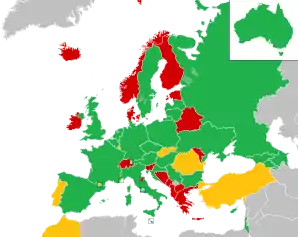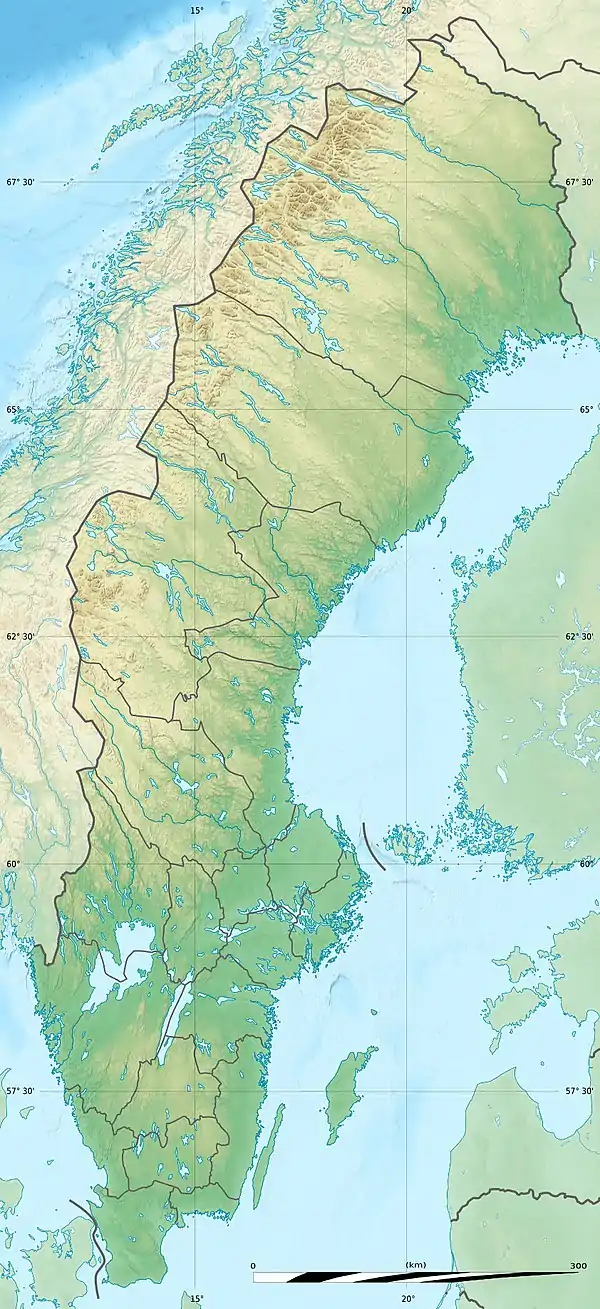Eurovision Song Contest 2016
The Eurovision Song Contest 2016 was the 61st edition of the annual Eurovision Song Contest. It took place in Stockholm, Sweden, following Måns Zelmerlöw's win at the 2015 contest in Vienna, Austria, with the song "Heroes". It was the sixth time Sweden had hosted the contest, having previously done so in 1975, 1985, 1992, 2000 and 2013. Organised by the European Broadcasting Union (EBU) and host broadcaster Sveriges Television (SVT), the contest was held at the Ericsson Globe and consisted of two semi-finals on 10 and 12 May, and the final on 14 May 2016. The three live shows were hosted by Måns Zelmerlöw and Petra Mede.
| Eurovision Song Contest 2016 | |
|---|---|
| Come Together | |
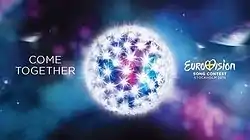 | |
| Dates | |
| Semi-final 1 | 10 May 2016 |
| Semi-final 2 | 12 May 2016 |
| Grand final | 14 May 2016 |
| Host | |
| Venue | Ericsson Globe Stockholm, Sweden |
| Presenter(s) | |
| Directed by |
|
| Executive supervisor | Jon Ola Sand |
| Executive producer |
|
| Host broadcaster | Sveriges Television (SVT) |
| Opening act |
|
| Interval act |
|
| Website | eurovision |
| Participants | |
| Number of entries | 42 |
| Debuting countries | None |
| Returning countries | |
| Non-returning countries | |
Participation map
| |
| Vote | |
| Voting system | Each country awards two sets of 12, 10, 8–1 points to their 10 favourite songs: one from their professional jury and the other from televoting. |
| Nul points | None |
| Winning song | |
Forty-two countries participated in the contest. Bosnia and Herzegovina, Bulgaria, Croatia and Ukraine returned after absences from recent contests, while Australia also returned after debuting as a special guest in 2015. Portugal did not enter, largely due to their national broadcaster's insufficient promotion of their music-based media, while Romania had planned to participate, but was disqualified due to repeated non-payment of debts by their national broadcaster to the EBU.
The winner was Ukraine with the song "1944", performed and written by Jamala. This was Ukraine's second victory in the contest, following their win in 2004. Australia, Russia, Bulgaria and Sweden rounded out the top five. This was the first time since the introduction of professional jury voting in 2009 that the overall winner won neither the jury vote, which was won by Australia, nor the televote, which was won by Russia, with Ukraine placing second in both. It was also the first song with lyrics in Crimean Tatar to win or enter the contest. Furthermore, this was the first winning song to be performed in one of the Turkic languages. The Czech Republic managed to qualify for the final for the first time in five attempts since its debut in 2007, while both Bosnia and Herzegovina and Greece failed to qualify from the semi-finals for the first time ever, the latter being absent from the final for the first time since 2000. In the final, Australia's second place finish was an improvement on its fifth place finish in 2015, while Bulgaria finished fourth, its best result since its debut and first participation in a final since 2007.
The contest was the first to implement a voting system change since 1975: each country's professional jury points were announced largely as before, while the results of each national televote were combined and announced in reverse order. It was also the first contest to be broadcast on live television in the United States, and the EBU recorded a record-breaking 204 million viewers worldwide for the contest, beating the 2015 viewing figures by over 5 million.
Location
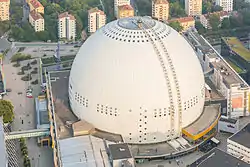
Venue
The contest took place in the Ericsson Globe in Stockholm, following Sweden's victory at the 2015 contest in Vienna with the song "Heroes", performed by Måns Zelmerlöw. The Ericsson Globe has a capacity of approximately 16,000 attendees, and this was the second time the contest has been staged at the venue, after the Eurovision Song Contest 2000.[1]
Bidding phase
Host broadcaster Sveriges Television (SVT) announced on 24 May, the day after winning the 2015 contest, that the Tele2 Arena in Stockholm was their first choice venue. However, other cities and arenas were invited to apply, and those making a bid had approximately three weeks to submit their offer to SVT.
SVT announced on 1 June the conditions under which cities and venues could announce their interest in hosting the contest:[2]
- SVT had to have access to the venue at least 4–6 weeks before the contest to build the stage and rig up lighting and technology.
- A press centre with a specific size had to be made available at the venue.
- A specific number of hotels and hotel rooms had to be made available in the vicinity of the venue.
- The host city had to be near a major airport.
An announcement regarding the venue was expected from SVT by midsummer,[3][4] with the Ericsson Globe announced as the venue on 8 July.[5]
Key
![]() Host venue
Host venue
| City[2] | Venue | Notes |
|---|---|---|
| Gothenburg | Scandinavium | Venue of the 1985 Eurovision Song Contest. |
| Ullevi | Proposal was dependent on the construction of a roof to cover the stadium. The idea was rejected due to costs.[6] | |
| Linköping | Saab Arena | — |
| Malmö[7] | Malmö Arena | Venue of the 2013 Eurovision Song Contest. Withdrew its bid on 11 June 2015, citing unavailability during the rehearsal weeks of the contest.[7] |
| Örnsköldsvik[8] | Fjällräven Center | — |
| Sandviken and Gävle[9] | Göransson Arena | If this option were chosen, Sandviken would have hosted the three live shows in the Göransson Arena, while Gävle would have hosted satellite events such as smaller concerts and shows.[10] |
| Stockholm[11] | ||
| Annexet | — | |
| Ericsson Globe |
Host venue of the 2000 Eurovision Song Contest and the final of Melodifestivalen in 1989 and between 2002 and 2012 inclusive. | |
| Friends Arena | Venue of the final of Melodifestivalen since 2013. Friends Arena is the biggest football stadium and indoor venue in Sweden and the Nordic countries. However, it was reportedly not part of Stockholm's bid.[11][12] | |
| Hovet | — | |
| Tele2 Arena | SVT announced on 24 May 2015 that Tele2 Arena was their first choice venue for the contest.[3][13] However, it was not possible to use the venue due to the 4–6 week organisation requirement, which would impact on the pre-scheduled home games of Hammarby Fotboll.[12] The EBU announced on 14 March 2016 that Tele2 Arena would host Eurovision The Party, and the results of the Swedish jury vote would be announced live from the event.[14] |
Format
The preliminary dates for the contest were announced on 16 March 2015 at a meeting of Heads of Delegation in Vienna, with the semi-finals took place on 10 and 12 May and the final on 14 May 2016.[15] These were subject to change depending on SVT,[16] but were later confirmed when Stockholm was announced as the host city.[5]
Discussions were held in 2014 between the EBU and the Asia-Pacific Broadcasting Union (ABU) regarding the inclusion of a guest performance from the ABU TV Song Festival at the contest. The EBU confirmed on 16 July 2015 that they are looking into the possibility of the proposal, which was discussed at the ABU General Assembly in 2014.[17]
SVT proposed a change of start time of the contest from 21:00 CEST to 20:00 CEST on 9 September, arguing that such a change would help to promote family viewing of the contest, especially in eastern Europe when it would run late into the night.[18] However, the EBU published the public rules of the contest on 28 October, which stated that the start time would remain at 21:00 CEST.[19]
The EBU announced on 23 September that rather than using clips from their respective music videos, extended clips from the dress rehearsals of the six acts who qualified directly to the final (the "Big Five" and Sweden) would be shown as previews during the semi-final in which they were allocated to vote.[20]
The core team for the contest was announced by SVT and the EBU on 26 October. Johan Bernhagen and Martin Österdahl were Executive Producers, while Tobias Åberg was Head of Production. The three live shows were directed by Sven Stojanović and the contest was produced by Christer Björkman.[21]
New voting system
The EBU announced on 18 February 2016 that a new voting system would be implemented at the contest for the first time since 1975. The new system, inspired by the voting system of Melodifestivalen, involves each country now awarding two sets of points from 1–8, 10 and 12: one from their professional jury and the other from televoting. Televoting votes from all the countries are pooled. After viewers have cast their votes, the results of each professional jury are presented, with countries receiving 1–8 and 10 points being displayed on-screen, instead of 1–7 as had been the case since 2006, and the national spokesperson announcing only the country to which they award 12 points. After the results of the professional juries are presented, the televoting points from all participating countries are combined, providing one score for each song. The new voting system is also used to determine the qualifiers from each semi-final, but, as before, the qualifiers are announced in a random order.[22][23]
As the new voting system gives equal weight to jury and televoting results, a national jury result cannot be used as backup result for the televoting or vice versa. Therefore, if a country cannot deliver a valid televoting/jury result, a substitute result is calculated by the jury/televoting result of a pre-selected group of countries approved by the contest's Reference Group. The Director General of Radiotelevisione della Repubblica di San Marino (SMRTV), Carlo Romeo, stated on 23 February that the use of a substitute televoting result discriminated against microstates like San Marino, which only used a professional jury due to their use of the Italian phone system and would therefore have its voting representation diminished under the new system, and criticised the EBU for not contacting its members before making the decision.[24][25]
Other Eurovision events
The EBU announced on 14 March 2016 that the Tele2 Arena in Stockholm would host a live event running alongside the final of the contest on 14 May.[14] Eurovision The Party, hosted by Sanna Nielsen, allowed fans to watch the final on a big screen and featured backstage material from the Ericsson Globe such as Nielsen conducting exclusive interviews and appearing with hosts Petra Mede and Måns Zelmerlöw. The results of the Swedish jury vote was also announced live from the event by Gina Dirawi. A pre-party and after-party was also held and featured performances from former contest winners Carola and Loreen as well as Danny Saucedo, Panetoz and DJ Tim Henri.[26][27] Executive Producer of the contest Johan Bernhagen has stated that the event complements existing events being held at the Eurovision Village and the EuroClub, and it is hoped that Eurovision The Party would become an annual event in the host city of the contest.[14]
Presenters
.jpg.webp)
After his victory in the 2015 contest, Måns Zelmerlöw announced his interest in hosting the 2016 contest.[28] His experience as a television presenter includes Melodifestivalen 2010[29] and SVT sing-along show Allsång på Skansen.[30] Christer Björkman told Expressen on 25 May that Gina Dirawi, Petra Mede and Sanna Nielsen were also being considered as hosts,[31] but it was reported on 1 June that SVT was considering Zelmerlöw and Dolph Lundgren as co-hosts.[32] Expressen reported on 19 August that Mede and Zelmerlöw were SVT's first choice of hosts,[33] with SVT announcing at a press conference on 14 December that they would indeed co-host.[34]
The press conferences were presented by Jovan Radomir and Catarina Rolfsdotter-Jansson, who also provided commentary from the red carpet event in front of the Stockholm Palace, before the official welcome party at Stockholm City Hall on 8 May 2016.[35][36]
Semi-final allocation draw
The draw to determine the allocation of the participating countries into their respective semi-finals took place at Stockholm City Hall on 25 January 2016, hosted by Alexandra Pascalidou and Jovan Radomir.[37] The first part of the draw determined in which semi-final the "Big Five" and Sweden would have to vote. The second part of the draw decided in which half of the respective semi-finals each country would perform, with the exact running order determined by the producers of the show at a later date. The EBU originally announced that the running order would be revealed on 5 April,[38] however for undisclosed reasons this was later put back to 8 April.[39] Eighteen countries participated in the first semi-final, while nineteen countries were planned to participate in the second semi-final, but this was reduced to eighteen on 22 April due to the disqualification of Romania. From each semi-final, ten countries joined the "Big 5" and Sweden in the final, where a total of twenty-six countries participated.
The thirty-seven semi-finalists were allocated into six pots, which were published by the EBU on 21 January, based on historical voting patterns as calculated by the contest's official televoting partner Digame. Drawing from different pots helps in reducing the chance of so-called neighbour voting and increasing suspense in the semi-finals. Sweden and Germany were pre-allocated to vote and perform in the first and second semi-final respectively due to requests from their respective broadcaster, which were approved by the EBU.[40][41]
| Pot 1 | Pot 2 | Pot 3 | Pot 4 | Pot 5 | Pot 6 |
|---|---|---|---|---|---|
Opening and interval acts
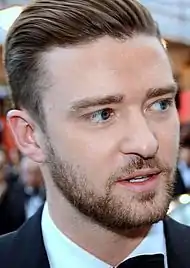
It was announced on 1 May 2016 that the opening act of the first semi-final would be a performance of "Heroes" by Måns Zelmerlöw,[42] while the opening act of the second semi-final would be a musical theatre comedy song entitled "That's Eurovision", composed by Matheson Bayley and written by Bayley, Edward af Sillén and Daniel Réhn, and performed by Zelmerlöw and Mede.[43] The opening act of the final was a parade of flags similar to final opening ceremonies since 2013, themed as a tribute to Swedish fashion design and dance music with artists being welcomed on stage in a catwalk fashion show with flags being projected onto 26 dresses designed by Bea Szenfeld.[44]
The interval acts of both semi-finals were sketches choreographed by Fredrik Rydman: "The Grey People" in the first semi-final and "Man meets machine" in the second semi-final respectively. The EBU announced on 9 May that one of the interval acts of the final would be a world premiere live performance of "Can't Stop the Feeling!" and "Rock Your Body" by Justin Timberlake.[45] He was the first "global megastar" in the contest's 61-year-history to perform during the interval.[46] Other interval acts in the final included a sketch called "Love Love Peace Peace", a pastiche of past entries such as No Name's song "Zauvijek moja" featuring appearances from Lordi and Alexander Rybak, winners of the contest in 2006 and 2009 respectively and performed by Zelmerlöw and Mede,[47] a sketch starring Lynda Woodruff, played by Sarah Dawn Finer, and a performance of "Fire in the Rain" and "Heroes" by Zelmerlöw, both from his latest album Perfectly Damaged.[48]
During the live broadcast of the final on Logo TV in the United States, Timberlake's performance was replaced by a reprise of "The Grey People" from the first semi-final. In an interview with The Guardian, the contest's Executive Supervisor, Jon Ola Sand, revealed that this was due to rights restrictions.[49][50][51]
Participating countries
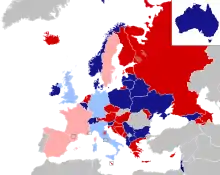
Participating countries had until 15 September 2015 to submit their applications for participation in the contest, and until 10 October to withdraw their applications without facing financial sanctions.[52] The EBU had initially announced on 26 November that 43 countries would participate in the contest, equalling the record number of participants set in 2008 and 2011.[53] However, Romania were disqualified from participation on 22 April 2016, subsequently reducing the number of participating countries to 42.[54]
Four countries returned after absences from recent contests: Bosnia and Herzegovina since 2012, Bulgaria and Croatia since 2013 and Ukraine since 2014. Australia also returned after debuting as a special guest in 2015, but by invitation of the EBU due to the associate membership status of the Special Broadcasting Service. However, instead of pre-qualifying for the final and voting in all three live shows, as was the case in 2015, Australia entered the second semi-final and voted only in that semi-final and the final. Portugal did not enter, largely due to their national broadcaster's insufficient promotion of their music-based media, as well as a poorly structured selection process,[55] while Romania were disqualified from participation on 22 April 2016 due to repeated non-payment of debts by their national broadcaster to the EBU.[54]
Returning artists
Seven artists returned after having previously participated in the contest. Deen returned after previously representing Bosnia and Herzegovina in 2004, finishing ninth in the final with the song "In The Disco".[56]
Kaliopi returned after previously representing Macedonia in 2012, finishing 13th in the final with the song "Crno i belo". She was also selected to represent Macedonia in 1996 with "Samo ti", but was eliminated in a non-televised pre-qualifying round.[57]
Poli Genova returned after previously representing Bulgaria in 2011, finishing 12th in the second semi-final with the song "Na inat".[58]
Bojan Jovović returned for Montenegro as part of Highway after previously representing Serbia and Montenegro in 2005 as part of No Name, finishing seventh in the final with the song "Zauvijek moja".[59]
Ira Losco returned after previously representing Malta in 2002, finishing in second place with the song "7th Wonder".[60]
Donny Montell returned after previously representing Lithuania in 2012, finishing 14th in the final with the song "Love Is Blind".[61]
Greta Salóme returned after previously representing Iceland in 2012 with Jónsi, finishing 20th in the final with the song "Never Forget".[62]
Armenian backing vocalist Monica previously represented Armenia in Junior Eurovision Song Contest 2008
Sahlene, who represented Estonia in Eurovision Song Contest 2002, returned as a backing vocalist for Australia.
Martina Majerle, who represented Slovenia in 2009 and provided backing vocals numerous times for Croatia 2003, Montenegro 2008, 2014 and Slovenia 2007, 2011, 2012, returned as a backing vocalist for Croatia.
Semi-final 1
Eighteen countries participated in the first semi-final. France, Spain, and Sweden voted in this semi-final.[41][63] The highlighted countries qualified for the final.[64]
Semi-final 2
Eighteen countries participated in the second semi-final. Germany, Italy, and the United Kingdom voted in this semi-final.[41][63] Romania were originally planned to perform twelfth in this semi-final, but were disqualified due to repeated non-payment of debts to the EBU, resulting in countries originally planned to perform thirteenth or later to do so one place earlier.[54] The highlighted countries qualified for the final.[68]
Final
26 countries participated in the final, with all 42 participating countries eligible to vote. The running order for the final was revealed after the second semi-final qualifiers' press conference on 13 May.[71]
Scoreboard
Semi-final 1
| Semi-final 1 | ||||||
|---|---|---|---|---|---|---|
| Place | Televoting | Points | Jury | Points | ||
| 1 | 194 | 155 | ||||
| 2 | 133 | 148 | ||||
| 3 | 119 | 127 | ||||
| 4 | 116 | 120 | ||||
| 5 | 95 | 102 | ||||
| 6 | 93 | 92 | ||||
| 7 | 93 | 80 | ||||
| 8 | 78 | 78 | ||||
| 9 | 54 | 71 | ||||
| 10 | 53 | 46 | ||||
| 11 | 49 | 37 | ||||
| 12 | 41 | 35 | ||||
| 13 | 24 | 27 | ||||
| 14 | 22 | 26 | ||||
| 15 | 16 | 24 | ||||
| 16 | 15 | 22 | ||||
| 17 | 14 | 19 | ||||
| 18 | 9 | 9 | ||||
| Voting procedure used: 100% Televoting 100% Jury vote |
Voting results (Jury vote)[73] | |||||||||||||||||||||||||||||||||||||||||
|---|---|---|---|---|---|---|---|---|---|---|---|---|---|---|---|---|---|---|---|---|---|---|---|---|---|---|---|---|---|---|---|---|---|---|---|---|---|---|---|---|---|---|
| Finland | 51 | 16 | 4 | 2 | 8 | 7 | 2 | 5 | 3 | 4 | ||||||||||||||||||||||||||||||||
| Greece | 44 | 22 | 3 | 7 | 3 | 6 | 3 | |||||||||||||||||||||||||||||||||||
| Moldova | 33 | 9 | 3 | 6 | 6 | 5 | 4 | |||||||||||||||||||||||||||||||||||
| Hungary | 197 | 119 | 7 | 3 | 8 | 3 | 4 | 12 | 6 | 5 | 8 | 1 | 2 | 4 | 5 | 10 | ||||||||||||||||||||||||||
| Croatia | 133 | 53 | 5 | 5 | 3 | 12 | 2 | 1 | 1 | 6 | 7 | 7 | 3 | 7 | 7 | 5 | 6 | 3 | ||||||||||||||||||||||||
| Netherlands | 197 | 95 | 12 | 1 | 4 | 6 | 2 | 4 | 12 | 10 | 6 | 12 | 2 | 12 | 1 | 8 | 4 | 6 | ||||||||||||||||||||||||
| Armenia | 243 | 116 | 7 | 10 | 10 | 5 | 5 | 5 | 12 | 10 | 5 | 2 | 12 | 5 | 7 | 12 | 3 | 12 | 5 | |||||||||||||||||||||||
| San Marino | 68 | 49 | 3 | 10 | 6 | |||||||||||||||||||||||||||||||||||||
| Russia | 342 | 194 | 6 | 12 | 12 | 10 | 6 | 1 | 7 | 3 | 12 | 8 | 1 | 12 | 8 | 10 | 8 | 10 | 2 | 8 | 12 | |||||||||||||||||||||
| Czech Republic | 161 | 41 | 10 | 8 | 8 | 12 | 4 | 5 | 4 | 5 | 5 | 10 | 6 | 2 | 4 | 8 | 12 | 3 | 1 | 6 | 7 | |||||||||||||||||||||
| Cyprus | 164 | 93 | 8 | 7 | 2 | 10 | 10 | 8 | 1 | 10 | 1 | 8 | 4 | 1 | 1 | |||||||||||||||||||||||||||
| Austria | 170 | 133 | 3 | 2 | 6 | 5 | 2 | 4 | 1 | 12 | 2 | |||||||||||||||||||||||||||||||
| Estonia | 24 | 15 | 1 | 2 | 2 | 1 | 1 | 2 | ||||||||||||||||||||||||||||||||||
| Azerbaijan | 185 | 93 | 2 | 5 | 7 | 3 | 7 | 6 | 10 | 3 | 4 | 4 | 7 | 5 | 3 | 6 | 7 | 5 | 8 | |||||||||||||||||||||||
| Montenegro | 60 | 14 | 6 | 10 | 10 | 3 | 7 | 3 | 7 | |||||||||||||||||||||||||||||||||
| Iceland | 51 | 24 | 4 | 1 | 1 | 7 | 4 | 1 | 3 | 4 | 2 | |||||||||||||||||||||||||||||||
| Bosnia and Herzegovina | 104 | 78 | 1 | 4 | 1 | 2 | 2 | 10 | 6 | |||||||||||||||||||||||||||||||||
| Malta | 209 | 54 | 8 | 4 | 6 | 12 | 7 | 8 | 12 | 5 | 8 | 8 | 8 | 12 | 8 | 4 | 10 | 6 | 2 | 10 | 7 | 10 | ||||||||||||||||||||
| Voting procedure used: 100% Televoting 100% Jury vote |
Voting results (Televoting vote)[73] | |||||||||||||||||||||||||||||||||||||||||
|---|---|---|---|---|---|---|---|---|---|---|---|---|---|---|---|---|---|---|---|---|---|---|---|---|---|---|---|---|---|---|---|---|---|---|---|---|---|---|---|---|---|---|
| Finland | 51 | 35 | 1 | 7 | 2 | 6 | ||||||||||||||||||||||||||||||||||||
| Greece | 44 | 22 | 7 | 3 | 12 | |||||||||||||||||||||||||||||||||||||
| Moldova | 33 | 24 | 5 | 2 | 2 | |||||||||||||||||||||||||||||||||||||
| Hungary | 197 | 78 | 4 | 7 | 6 | 8 | 6 | 6 | 7 | 6 | 6 | 6 | 8 | 5 | 7 | 6 | 6 | 1 | 8 | 7 | 5 | 4 | ||||||||||||||||||||
| Croatia | 133 | 80 | 2 | 4 | 2 | 5 | 3 | 4 | 2 | 1 | 6 | 8 | 12 | 1 | 2 | 1 | ||||||||||||||||||||||||||
| Netherlands | 197 | 102 | 6 | 2 | 6 | 5 | 4 | 6 | 3 | 4 | 10 | 8 | 4 | 10 | 7 | 4 | 6 | 10 | ||||||||||||||||||||||||
| Armenia | 243 | 127 | 1 | 8 | 8 | 2 | 3 | 12 | 8 | 12 | 12 | 7 | 4 | 1 | 3 | 3 | 3 | 4 | 12 | 10 | 3 | |||||||||||||||||||||
| San Marino | 68 | 19 | 3 | 6 | 4 | 5 | 4 | 5 | 4 | 10 | 2 | 1 | 5 | |||||||||||||||||||||||||||||
| Russia | 342 | 148 | 8 | 10 | 10 | 10 | 10 | 8 | 12 | 12 | 8 | 10 | 7 | 12 | 12 | 10 | 12 | 7 | 12 | 8 | 8 | 8 | ||||||||||||||||||||
| Czech Republic | 161 | 120 | 3 | 3 | 3 | 4 | 2 | 2 | 2 | 1 | 1 | 3 | 1 | 4 | 2 | 3 | 7 | |||||||||||||||||||||||||
| Cyprus | 164 | 71 | 7 | 12 | 7 | 2 | 3 | 8 | 5 | 8 | 4 | 2 | 6 | 1 | 5 | 5 | 2 | 6 | 5 | 3 | 2 | |||||||||||||||||||||
| Austria | 170 | 37 | 10 | 5 | 7 | 8 | 7 | 10 | 5 | 3 | 10 | 5 | 3 | 10 | 6 | 8 | 6 | 1 | 10 | 12 | 7 | |||||||||||||||||||||
| Estonia | 24 | 9 | 12 | 1 | 2 | |||||||||||||||||||||||||||||||||||||
| Azerbaijan | 185 | 92 | 12 | 12 | 10 | 7 | 10 | 8 | 7 | 7 | 10 | 10 | ||||||||||||||||||||||||||||||
| Montenegro | 60 | 46 | 6 | 8 | ||||||||||||||||||||||||||||||||||||||
| Iceland | 51 | 27 | 5 | 1 | 3 | 3 | 3 | 4 | 5 | |||||||||||||||||||||||||||||||||
| Bosnia and Herzegovina | 104 | 26 | 12 | 7 | 1 | 4 | 7 | 12 | 5 | 12 | 6 | 12 | ||||||||||||||||||||||||||||||
| Malta | 209 | 155 | 1 | 5 | 4 | 1 | 1 | 10 | 2 | 1 | 5 | 2 | 8 | 4 | 4 | 5 | 1 | |||||||||||||||||||||||||
12 points
Countries in bold gave the maximum 24 points (12 points apiece from professional jury and televoting) to the specified entrant.
Jury
Below is a summary of the maximum 12 points awarded by each country's professional jury in the first semi-final:
|
|
Televoting
Below is a summary of the maximum 12 points awarded by each country's televote in the first semi-final:
|
|
Semi-final 2
| Semi-final 2 | ||||||
|---|---|---|---|---|---|---|
| Place | Televoting | Points | Jury | Points | ||
| 1 | 152 | 188 | ||||
| 2 | 142 | 139 | ||||
| 3 | 135 | 135 | ||||
| 4 | 131 | 127 | ||||
| 5 | 122 | 104 | ||||
| 6 | 118 | 98 | ||||
| 7 | 68 | 84 | ||||
| 8 | 54 | 64 | ||||
| 9 | 52 | 55 | ||||
| 10 | 50 | 49 | ||||
| 11 | 39 | 34 | ||||
| 12 | 35 | 32 | ||||
| 13 | 34 | 29 | ||||
| 14 | 31 | 25 | ||||
| 15 | 24 | 20 | ||||
| 16 | 20 | 15 | ||||
| 17 | 8 | 10 | ||||
| 18 | 3 | 10 | ||||
| Voting procedure used: 100% Televoting 100% Jury vote |
Voting results (Jury vote)[74] | ||||||||||||||||||||||||||||||||||||||||||||
|---|---|---|---|---|---|---|---|---|---|---|---|---|---|---|---|---|---|---|---|---|---|---|---|---|---|---|---|---|---|---|---|---|---|---|---|---|---|---|---|---|---|---|---|---|---|
| Latvia | 132 | 68 | 6 | 6 | 7 | 4 | 2 | 7 | 10 | 3 | 6 | 2 | 5 | 1 | 5 | ||||||||||||||||||||||||||||||
| Poland | 151 | 131 | 1 | 3 | 3 | 1 | 4 | 3 | 2 | 3 | |||||||||||||||||||||||||||||||||||
| Switzerland | 28 | 3 | 1 | 5 | 1 | 7 | 2 | 7 | 1 | 1 | |||||||||||||||||||||||||||||||||||
| Israel | 147 | 20 | 2 | 8 | 10 | 1 | 7 | 7 | 6 | 6 | 10 | 4 | 5 | 5 | 7 | 5 | 6 | 4 | 10 | 12 | 8 | 4 | |||||||||||||||||||||||
| Belarus | 84 | 52 | 1 | 4 | 1 | 2 | 6 | 2 | 6 | 5 | 2 | 3 | |||||||||||||||||||||||||||||||||
| Serbia | 105 | 50 | 5 | 1 | 3 | 5 | 12 | 3 | 8 | 3 | 8 | 2 | 5 | ||||||||||||||||||||||||||||||||
| Ireland | 46 | 31 | 2 | 4 | 2 | 3 | 2 | 2 | |||||||||||||||||||||||||||||||||||||
| Macedonia | 88 | 54 | 8 | 12 | 2 | 12 | |||||||||||||||||||||||||||||||||||||||
| Lithuania | 222 | 118 | 12 | 3 | 8 | 4 | 10 | 5 | 3 | 5 | 7 | 1 | 3 | 10 | 8 | 8 | 2 | 3 | 3 | 1 | 8 | ||||||||||||||||||||||||
| Australia | 330 | 142 | 8 | 10 | 12 | 12 | 8 | 4 | 6 | 4 | 12 | 5 | 12 | 12 | 12 | 12 | 8 | 10 | 12 | 7 | 12 | 10 | |||||||||||||||||||||||
| Slovenia | 57 | 8 | 3 | 6 | 8 | 7 | 1 | 4 | 1 | 6 | 7 | 6 | |||||||||||||||||||||||||||||||||
| Bulgaria | 220 | 122 | 7 | 5 | 4 | 3 | 4 | 2 | 10 | 8 | 2 | 8 | 6 | 7 | 10 | 7 | 6 | 4 | 5 | ||||||||||||||||||||||||||
| Denmark | 34 | 24 | 3 | 4 | 3 | ||||||||||||||||||||||||||||||||||||||||
| Ukraine | 287 | 152 | 10 | 12 | 5 | 10 | 7 | 10 | 10 | 8 | 8 | 4 | 1 | 6 | 12 | 5 | 5 | 6 | 10 | 6 | |||||||||||||||||||||||||
| Norway | 63 | 34 | 2 | 6 | 4 | 5 | 6 | 1 | 4 | 1 | |||||||||||||||||||||||||||||||||||
| Georgia | 123 | 39 | 6 | 7 | 5 | 2 | 3 | 1 | 1 | 10 | 7 | 4 | 1 | 8 | 10 | 7 | 12 | ||||||||||||||||||||||||||||
| Albania | 45 | 35 | 8 | 2 | |||||||||||||||||||||||||||||||||||||||||
| Belgium | 274 | 135 | 4 | 2 | 7 | 6 | 12 | 12 | 3 | 5 | 12 | 12 | 10 | 8 | 10 | 7 | 10 | 8 | 4 | 7 | |||||||||||||||||||||||||
| Voting procedure used: 100% Televoting 100% Jury vote |
Voting results (Televoting vote)[74] | ||||||||||||||||||||||||||||||||||||||||||||
|---|---|---|---|---|---|---|---|---|---|---|---|---|---|---|---|---|---|---|---|---|---|---|---|---|---|---|---|---|---|---|---|---|---|---|---|---|---|---|---|---|---|---|---|---|---|
| Latvia | 132 | 64 | 5 | 5 | 7 | 7 | 12 | 5 | 2 | 3 | 3 | 8 | 3 | 3 | 5 | ||||||||||||||||||||||||||||||
| Poland | 151 | 20 | 4 | 7 | 6 | 6 | 1 | 10 | 1 | 7 | 4 | 6 | 6 | 12 | 10 | 7 | 12 | 12 | 10 | 10 | |||||||||||||||||||||||||
| Switzerland | 28 | 25 | 3 | ||||||||||||||||||||||||||||||||||||||||||
| Israel | 147 | 127 | 1 | 2 | 6 | 2 | 2 | 1 | 1 | 1 | 2 | 2 | |||||||||||||||||||||||||||||||||
| Belarus | 84 | 32 | 7 | 8 | 3 | 5 | 1 | 6 | 4 | 1 | 10 | 6 | 1 | ||||||||||||||||||||||||||||||||
| Serbia | 105 | 55 | 12 | 10 | 2 | 12 | 5 | 2 | 1 | 6 | |||||||||||||||||||||||||||||||||||
| Ireland | 46 | 15 | 1 | 2 | 2 | 1 | 1 | 7 | 4 | 2 | 4 | 7 | |||||||||||||||||||||||||||||||||
| Macedonia | 88 | 34 | 4 | 2 | 12 | 4 | 10 | 8 | 12 | 2 | |||||||||||||||||||||||||||||||||||
| Lithuania | 222 | 104 | 10 | 3 | 5 | 10 | 12 | 8 | 3 | 7 | 6 | 12 | 10 | 4 | 8 | 4 | 4 | 12 | |||||||||||||||||||||||||||
| Australia | 330 | 188 | 8 | 10 | 6 | 12 | 7 | 7 | 8 | 4 | 5 | 6 | 7 | 8 | 7 | 8 | 4 | 6 | 10 | 10 | 3 | 6 | |||||||||||||||||||||||
| Slovenia | 57 | 49 | 4 | 3 | 1 | ||||||||||||||||||||||||||||||||||||||||
| Bulgaria | 220 | 98 | 3 | 4 | 3 | 10 | 8 | 8 | 5 | 8 | 3 | 10 | 5 | 3 | 5 | 6 | 5 | 7 | 7 | 7 | 7 | 8 | |||||||||||||||||||||||
| Denmark | 34 | 10 | 2 | 1 | 1 | 4 | 3 | 1 | 5 | 2 | 5 | ||||||||||||||||||||||||||||||||||
| Ukraine | 287 | 135 | 12 | 12 | 5 | 7 | 12 | 6 | 4 | 6 | 10 | 3 | 8 | 12 | 5 | 4 | 12 | 5 | 6 | 8 | 12 | 3 | |||||||||||||||||||||||
| Norway | 63 | 29 | 3 | 3 | 2 | 2 | 2 | 1 | 10 | 1 | 10 | ||||||||||||||||||||||||||||||||||
| Georgia | 123 | 84 | 5 | 7 | 2 | 2 | 8 | 1 | 8 | 5 | 1 | ||||||||||||||||||||||||||||||||||
| Albania | 45 | 10 | 10 | 12 | 3 | 2 | 8 | ||||||||||||||||||||||||||||||||||||||
| Belgium | 274 | 139 | 6 | 6 | 8 | 8 | 4 | 10 | 6 | 5 | 4 | 12 | 7 | 10 | 12 | 4 | 7 | 3 | 8 | 6 | 5 | 4 | |||||||||||||||||||||||
12 points
Countries in bold gave the maximum 24 points (12 points apiece from professional jury and televoting) to the specified entrant.
Jury
Below is a summary of the maximum 12 points award by each country's professional jury in the second semi-final:
|
|
Televoting
Below is a summary of the maximum 12 points awarded by each country's televote in the second semi-final:
|
|
Final
| Final | ||||||
|---|---|---|---|---|---|---|
| Place | Televoting | Points | Jury | Points | ||
| 1 | 361 | 320 | ||||
| 2 | 323 | 211 | ||||
| 3 | 222 | 148 | ||||
| 4 | 191 | 137 | ||||
| 5 | 180 | 130 | ||||
| 6 | 139 | 130 | ||||
| 7 | 134 | 127 | ||||
| 8 | 120 | 124 | ||||
| 9 | 109 | 122 | ||||
| 10 | 96 | 115 | ||||
| 11 | 80 | 114 | ||||
| 12 | 73 | 104 | ||||
| 13 | 63 | 90 | ||||
| 14 | 56 | 80 | ||||
| 15 | 53 | 69 | ||||
| 16 | 51 | 67 | ||||
| 17 | 39 | 54 | ||||
| 18 | 34 | 52 | ||||
| 19 | 33 | 44 | ||||
| 20 | 24 | 43 | ||||
| 21 | 16 | 41 | ||||
| 22 | 11 | 40 | ||||
| 23 | 10 | 35 | ||||
| 24 | 10 | 31 | ||||
| 25 | 8 | 7 | ||||
| 26 | 0 | 1 | ||||
| Voting procedure used: 100% Televoting 100% Jury vote |
Voting results (Jury vote)[75] | ||||||||||||||||||||||||||||||||||||||||||||
|---|---|---|---|---|---|---|---|---|---|---|---|---|---|---|---|---|---|---|---|---|---|---|---|---|---|---|---|---|---|---|---|---|---|---|---|---|---|---|---|---|---|---|---|---|---|
| Belgium | 181 | 51 | 5 | 3 | 2 | 12 | 10 | 10 | 8 | 4 | 10 | 4 | 6 | 4 | 5 | 5 | 12 | 5 | 4 | 10 | 8 | 3 | |||||||||||||||||||||||
| Czech Republic | 41 | 0 | 4 | 5 | 2 | 6 | 3 | 1 | 1 | 10 | 4 | 2 | 3 | ||||||||||||||||||||||||||||||||
| Netherlands | 153 | 39 | 12 | 4 | 7 | 8 | 3 | 10 | 5 | 7 | 7 | 2 | 3 | 4 | 6 | 3 | 4 | 5 | 2 | 6 | 4 | 1 | 6 | 5 | |||||||||||||||||||||
| Azerbaijan | 117 | 73 | 1 | 2 | 2 | 1 | 2 | 10 | 1 | 1 | 7 | 7 | 10 | ||||||||||||||||||||||||||||||||
| Hungary | 108 | 56 | 4 | 2 | 10 | 10 | 4 | 1 | 5 | 3 | 1 | 2 | 3 | 7 | |||||||||||||||||||||||||||||||
| Italy | 124 | 34 | 10 | 6 | 8 | 5 | 2 | 2 | 12 | 3 | 6 | 3 | 12 | 10 | 3 | 8 | |||||||||||||||||||||||||||||
| Israel | 135 | 11 | 3 | 4 | 3 | 1 | 1 | 7 | 8 | 2 | 5 | 7 | 2 | 12 | 3 | 10 | 2 | 3 | 7 | 6 | 7 | 5 | 3 | 6 | 8 | 7 | 2 | ||||||||||||||||||
| Bulgaria | 307 | 180 | 8 | 10 | 3 | 10 | 1 | 6 | 10 | 7 | 1 | 7 | 1 | 8 | 8 | 6 | 5 | 2 | 4 | 10 | 4 | 1 | 3 | 10 | 2 | ||||||||||||||||||||
| Sweden | 261 | 139 | 8 | 6 | 12 | 5 | 6 | 12 | 4 | 5 | 6 | 10 | 8 | 8 | 10 | 12 | 4 | 2 | 4 | ||||||||||||||||||||||||||
| Germany | 11 | 10 | 1 | ||||||||||||||||||||||||||||||||||||||||||
| France | 257 | 109 | 7 | 2 | 5 | 3 | 4 | 7 | 6 | 7 | 1 | 12 | 7 | 5 | 8 | 7 | 6 | 8 | 6 | 8 | 6 | 1 | 10 | 1 | 7 | 1 | 5 | 8 | |||||||||||||||||
| Poland | 229 | 222 | 2 | 1 | 3 | 1 | |||||||||||||||||||||||||||||||||||||||
| Australia | 511 | 191 | 12 | 10 | 7 | 8 | 10 | 3 | 8 | 8 | 12 | 10 | 6 | 10 | 5 | 10 | 8 | 12 | 5 | 10 | 6 | 6 | 2 | 10 | 12 | 8 | 12 | 7 | 12 | 6 | 8 | 12 | 10 | 5 | 6 | 10 | 6 | 12 | 4 | 12 | |||||
| Cyprus | 96 | 53 | 5 | 5 | 2 | 6 | 4 | 7 | 1 | 8 | 4 | 1 | |||||||||||||||||||||||||||||||||
| Serbia | 115 | 80 | 8 | 5 | 2 | 2 | 7 | 5 | 6 | ||||||||||||||||||||||||||||||||||||
| Lithuania | 200 | 96 | 1 | 5 | 3 | 5 | 6 | 7 | 5 | 4 | 1 | 10 | 1 | 10 | 1 | 2 | 7 | 4 | 8 | 5 | 12 | 2 | 3 | 2 | |||||||||||||||||||||
| Croatia | 73 | 33 | 6 | 7 | 8 | 2 | 4 | 1 | 1 | 3 | 1 | 1 | 6 | ||||||||||||||||||||||||||||||||
| Russia | 491 | 361 | 3 | 8 | 12 | 7 | 5 | 4 | 4 | 1 | 7 | 2 | 12 | 6 | 7 | 12 | 6 | 12 | 1 | 7 | 8 | 6 | |||||||||||||||||||||||
| Spain | 77 | 10 | 1 | 2 | 1 | 3 | 8 | 3 | 4 | 4 | 7 | 5 | 6 | 12 | 5 | 5 | 1 | ||||||||||||||||||||||||||||
| Latvia | 132 | 63 | 1 | 1 | 7 | 3 | 5 | 2 | 3 | 7 | 3 | 8 | 8 | 6 | 7 | 8 | |||||||||||||||||||||||||||||
| Ukraine | 534 | 323 | 10 | 12 | 12 | 12 | 6 | 12 | 12 | 3 | 12 | 12 | 7 | 7 | 4 | 2 | 3 | 10 | 2 | 8 | 12 | 12 | 7 | 10 | 12 | 12 | |||||||||||||||||||
| Malta | 153 | 16 | 10 | 4 | 6 | 3 | 6 | 6 | 5 | 4 | 3 | 8 | 6 | 7 | 4 | 5 | 8 | 4 | 10 | 2 | 2 | 5 | 10 | 12 | 7 | ||||||||||||||||||||
| Georgia | 104 | 24 | 6 | 10 | 3 | 8 | 5 | 7 | 12 | 5 | 10 | 3 | 3 | 8 | |||||||||||||||||||||||||||||||
| Austria | 151 | 120 | 1 | 1 | 4 | 4 | 8 | 8 | 5 | ||||||||||||||||||||||||||||||||||||
| United Kingdom | 62 | 8 | 8 | 4 | 7 | 12 | 3 | 6 | 4 | 2 | 5 | 3 | |||||||||||||||||||||||||||||||||
| Armenia | 249 | 134 | 2 | 2 | 7 | 12 | 2 | 5 | 8 | 12 | 2 | 6 | 2 | 3 | 12 | 4 | 10 | 4 | 3 | 4 | 1 | 10 | 4 | ||||||||||||||||||||||
| Voting procedure used: 100% Televoting 100% Jury vote |
Voting results (Televoting vote)[75] | ||||||||||||||||||||||||||||||||||||||||||||
|---|---|---|---|---|---|---|---|---|---|---|---|---|---|---|---|---|---|---|---|---|---|---|---|---|---|---|---|---|---|---|---|---|---|---|---|---|---|---|---|---|---|---|---|---|---|
| Belgium | 181 | 130 | 3 | 8 | 4 | 12 | 1 | 2 | 12 | 5 | 4 | ||||||||||||||||||||||||||||||||||
| Czech Republic | 41 | 41 | |||||||||||||||||||||||||||||||||||||||||||
| Netherlands | 153 | 114 | 6 | 6 | 3 | 7 | 3 | 10 | 2 | 2 | |||||||||||||||||||||||||||||||||||
| Azerbaijan | 117 | 44 | 1 | 6 | 7 | 8 | 6 | 8 | 1 | 3 | 2 | 8 | 6 | 10 | 7 | ||||||||||||||||||||||||||||||
| Hungary | 108 | 52 | 7 | 1 | 3 | 2 | 1 | 5 | 3 | 4 | 3 | 3 | 2 | 2 | 10 | 1 | 6 | 3 | |||||||||||||||||||||||||||
| Italy | 124 | 90 | 7 | 3 | 7 | 1 | 1 | 10 | 1 | 4 | |||||||||||||||||||||||||||||||||||
| Israel | 135 | 124 | 6 | 3 | 2 | ||||||||||||||||||||||||||||||||||||||||
| Bulgaria | 307 | 127 | 5 | 8 | 3 | 5 | 5 | 3 | 2 | 8 | 12 | 4 | 5 | 2 | 12 | 1 | 1 | 7 | 4 | 4 | 5 | 10 | 5 | 8 | 1 | 7 | 8 | 10 | 8 | 2 | 7 | 3 | 2 | 4 | 5 | 4 | |||||||||
| Sweden | 261 | 122 | 7 | 12 | 4 | 2 | 2 | 1 | 10 | 12 | 2 | 2 | 1 | 3 | 2 | 7 | 2 | 8 | 2 | 7 | 1 | 1 | 7 | 7 | 1 | 3 | 10 | 1 | 10 | 5 | 7 | ||||||||||||||
| Germany | 11 | 1 | 2 | 8 | |||||||||||||||||||||||||||||||||||||||||
| France | 257 | 148 | 1 | 5 | 4 | 4 | 2 | 10 | 3 | 3 | 2 | 6 | 7 | 6 | 4 | 12 | 3 | 1 | 7 | 8 | 2 | 4 | 3 | 2 | 5 | 1 | 1 | 3 | |||||||||||||||||
| Poland | 229 | 7 | 12 | 10 | 3 | 7 | 7 | 10 | 4 | 5 | 5 | 5 | 5 | 7 | 1 | 2 | 6 | 10 | 5 | 4 | 6 | 10 | 5 | 10 | 12 | 10 | 4 | 3 | 6 | 2 | 5 | 1 | 8 | 10 | 4 | 8 | 10 | ||||||||
| Australia | 511 | 320 | 3 | 8 | 2 | 5 | 1 | 6 | 1 | 3 | 12 | 4 | 7 | 1 | 10 | 5 | 5 | 5 | 5 | 6 | 5 | 1 | 5 | 4 | 8 | 4 | 6 | 5 | 5 | 5 | 6 | 3 | 12 | 4 | 4 | 7 | 3 | 3 | 12 | ||||||
| Cyprus | 96 | 43 | 1 | 6 | 7 | 7 | 2 | 12 | 3 | 3 | 6 | 1 | 5 | ||||||||||||||||||||||||||||||||
| Serbia | 115 | 35 | 4 | 12 | 12 | 12 | 12 | 4 | 12 | 12 | |||||||||||||||||||||||||||||||||||
| Lithuania | 200 | 104 | 4 | 8 | 12 | 5 | 6 | 3 | 3 | 8 | 12 | 1 | 12 | 4 | 5 | 3 | 2 | 2 | 6 | ||||||||||||||||||||||||||
| Croatia | 73 | 40 | 10 | 4 | 5 | 8 | 6 | ||||||||||||||||||||||||||||||||||||||
| Russia | 491 | 130 | 8 | 7 | 12 | 10 | 10 | 8 | 8 | 6 | 10 | 8 | 8 | 6 | 4 | 6 | 12 | 12 | 10 | 12 | 3 | 12 | 10 | 12 | 12 | 6 | 5 | 6 | 7 | 8 | 10 | 8 | 12 | 8 | 7 | 12 | 12 | 8 | 8 | 10 | 10 | 10 | 8 | ||
| Spain | 77 | 67 | 2 | 1 | 2 | 4 | 1 | ||||||||||||||||||||||||||||||||||||||
| Latvia | 132 | 69 | 6 | 7 | 6 | 2 | 1 | 5 | 1 | 3 | 3 | 12 | 7 | 5 | 5 | ||||||||||||||||||||||||||||||
| Ukraine | 534 | 211 | 10 | 10 | 12 | 12 | 4 | 10 | 7 | 4 | 7 | 12 | 4 | 3 | 10 | 10 | 10 | 7 | 10 | 7 | 10 | 8 | 10 | 6 | 10 | 4 | 8 | 2 | 5 | 10 | 6 | 10 | 7 | 6 | 6 | 8 | 12 | 12 | 7 | 12 | 8 | 7 | |||
| Malta | 153 | 137 | 5 | 5 | 6 | ||||||||||||||||||||||||||||||||||||||||
| Georgia | 104 | 80 | 1 | 8 | 2 | 4 | 6 | 3 | |||||||||||||||||||||||||||||||||||||
| Austria | 151 | 31 | 2 | 4 | 1 | 5 | 2 | 6 | 10 | 1 | 8 | 4 | 4 | 4 | 6 | 4 | 3 | 7 | 8 | 3 | 3 | 6 | 1 | 1 | 6 | 4 | 6 | 6 | 5 | ||||||||||||||||
| United Kingdom | 62 | 54 | 3 | 1 | 4 | ||||||||||||||||||||||||||||||||||||||||
| Armenia | 249 | 115 | 2 | 8 | 12 | 6 | 12 | 7 | 8 | 8 | 8 | 6 | 7 | 2 | 12 | 7 | 8 | 2 | 7 | 2 | 7 | 1 | 2 | ||||||||||||||||||||||
12 points
Countries in bold gave the maximum 24 points (12 points apiece from professional jury and televoting) to the specified entrant.
Jury
Below is a summary of the maximum 12 points awarded by each country's professional jury in the final:
|
|
|
|
Televoting
Below is a summary of the maximum 12 points awarded by each country's televote in the final:
|
|
|
|
While no country received nul points when the two sets of points were combined, the Czech Republic received nul points in televoting.
Other countries
Eligibility for potential participation in the Eurovision Song Contest requires a national broadcaster with active EBU membership that would be able to broadcast the contest via the Eurovision network.[76] The EBU issued an invitation of participation in the contest to all fifty-six active members and associate member Australia, with forty-three countries confirming their participation.[53] Morocco, Tunisia and five other countries did not publish their reasons for declining, however the following countries declined to participate, stating their reasons as shown below.
Active EBU members
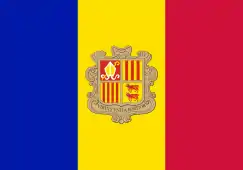 Andorra – Ràdio i Televisió d'Andorra (RTVA) announced on 2 September 2015 that Andorra would not participate in the contest.[77]
Andorra – Ràdio i Televisió d'Andorra (RTVA) announced on 2 September 2015 that Andorra would not participate in the contest.[77]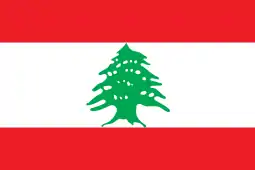 Lebanon – Télé Liban (TL) had not ruled out participation as of 15 October 2015, stating in an email: "We are not sure yet, however we are working on it and will keep you updated".[78] However, Lebanon was not on the final list of participating countries announced by the EBU on 26 November.
Lebanon – Télé Liban (TL) had not ruled out participation as of 15 October 2015, stating in an email: "We are not sure yet, however we are working on it and will keep you updated".[78] However, Lebanon was not on the final list of participating countries announced by the EBU on 26 November. Luxembourg – RTL Télé Lëtzebuerg (RTL) announced on 4 September 2015 that Luxembourg would not participate in the contest, due to the financial and organisational strain of a potential participation on the channel, especially with a small financial budget.[79]
Luxembourg – RTL Télé Lëtzebuerg (RTL) announced on 4 September 2015 that Luxembourg would not participate in the contest, due to the financial and organisational strain of a potential participation on the channel, especially with a small financial budget.[79]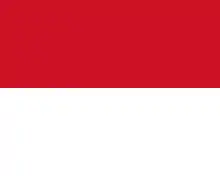 Monaco – Télé Monte Carlo (TMC) announced on 21 July 2015 that Monaco would not participate in the contest.[80]
Monaco – Télé Monte Carlo (TMC) announced on 21 July 2015 that Monaco would not participate in the contest.[80] Portugal – Rádio e Televisão de Portugal (RTP) had encouraged viewers to suggest changes to their selection process, assuming they had chosen to participate in the contest. Portugal has failed to qualify for the final since 2010, which the majority of the Portuguese public believe is because of RTP's current selection format, Festival da Canção.[55] Kátia Aveiro, sister of Cristiano Ronaldo, had launched a campaign on Twitter asking fans to back her bid to represent Portugal.[81] However, RTP announced on 7 October 2015 that Portugal would not participate in the 2016 contest, adding that they were looking forward to participating in the 2017 contest with a restructured selection process.[82] RTP's ombudsman, Jaime Fernandes, stated on 7 November during the television show A Voz do Cidadão that the decision was due not only to poor results in previous contests, but also RTP's rather insufficient promotion of music-related content.[83]
Portugal – Rádio e Televisão de Portugal (RTP) had encouraged viewers to suggest changes to their selection process, assuming they had chosen to participate in the contest. Portugal has failed to qualify for the final since 2010, which the majority of the Portuguese public believe is because of RTP's current selection format, Festival da Canção.[55] Kátia Aveiro, sister of Cristiano Ronaldo, had launched a campaign on Twitter asking fans to back her bid to represent Portugal.[81] However, RTP announced on 7 October 2015 that Portugal would not participate in the 2016 contest, adding that they were looking forward to participating in the 2017 contest with a restructured selection process.[82] RTP's ombudsman, Jaime Fernandes, stated on 7 November during the television show A Voz do Cidadão that the decision was due not only to poor results in previous contests, but also RTP's rather insufficient promotion of music-related content.[83] Romania – Romania had originally confirmed their participation in the contest with the song "Moment of Silence", performed by Ovidiu Anton. However, the EBU announced on 22 April 2016 that Televiziunea Română (TVR) had repeatedly failed to pay debts totalling CHF 16 million (€14.56 million) by 20 April, the deadline set by the EBU. TVR's failure to repay their debts resulted in their expulsion from the EBU, and consequently Romania's disqualification from the contest.[84] This has led to strong reactions against the decision.[85]
Romania – Romania had originally confirmed their participation in the contest with the song "Moment of Silence", performed by Ovidiu Anton. However, the EBU announced on 22 April 2016 that Televiziunea Română (TVR) had repeatedly failed to pay debts totalling CHF 16 million (€14.56 million) by 20 April, the deadline set by the EBU. TVR's failure to repay their debts resulted in their expulsion from the EBU, and consequently Romania's disqualification from the contest.[84] This has led to strong reactions against the decision.[85] Slovakia – Rozhlas a televízia Slovenska (RTVS) returned to the Eurovision Young Dancers in 2015, with RTVS explaining that the return of Slovakia to EYD supported domestic production and promoted national culture at a European level. RTVS announced on 28 September 2015 that Slovakia would not participate in the contest.[86] RTVS' PR manager, Juraj Kadáš, explained on 12 April 2016 that Slovakia's absence from the contest since 2012 was not due to poor results, but rather the cost associated with participation.[87]
Slovakia – Rozhlas a televízia Slovenska (RTVS) returned to the Eurovision Young Dancers in 2015, with RTVS explaining that the return of Slovakia to EYD supported domestic production and promoted national culture at a European level. RTVS announced on 28 September 2015 that Slovakia would not participate in the contest.[86] RTVS' PR manager, Juraj Kadáš, explained on 12 April 2016 that Slovakia's absence from the contest since 2012 was not due to poor results, but rather the cost associated with participation.[87] Turkey – The EBU announced on 2 October 2015 that despite speculation surrounding their participation, Türkiye Radyo ve Televizyon Kurumu (TRT) had yet to make a final decision.[88] However, TRT announced on 3 November that Turkey would not participate in the contest, adding their discontent at the introduction of a mixed voting system to the contest and the pre-qualification of the Big Five for the final. It was later revealed that singer Atiye would have gone to Eurovision 2016.[89][90][91]
Turkey – The EBU announced on 2 October 2015 that despite speculation surrounding their participation, Türkiye Radyo ve Televizyon Kurumu (TRT) had yet to make a final decision.[88] However, TRT announced on 3 November that Turkey would not participate in the contest, adding their discontent at the introduction of a mixed voting system to the contest and the pre-qualification of the Big Five for the final. It was later revealed that singer Atiye would have gone to Eurovision 2016.[89][90][91]
Associate EBU members
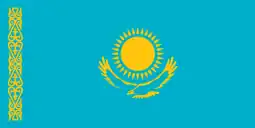 Kazakhstan – The EBU announced on 18 December 2015 that Khabar Agency would have associate EBU membership from 1 January 2016. However, Kazakhstan would be unable to debut at the contest as eligibility for participation requires a national broadcaster with active EBU membership.[92]
Kazakhstan – The EBU announced on 18 December 2015 that Khabar Agency would have associate EBU membership from 1 January 2016. However, Kazakhstan would be unable to debut at the contest as eligibility for participation requires a national broadcaster with active EBU membership.[92]
EBU non-members
 China – Hunan Television announced its interest in participating in the contest on 22 May 2015, with the EBU responding, saying that "we are open and are always looking for new elements in each Eurovision Song Contest".[93] However, on 3 June, the EBU denied that China would debut at the contest as a guest or full participant.[94]
China – Hunan Television announced its interest in participating in the contest on 22 May 2015, with the EBU responding, saying that "we are open and are always looking for new elements in each Eurovision Song Contest".[93] However, on 3 June, the EBU denied that China would debut at the contest as a guest or full participant.[94]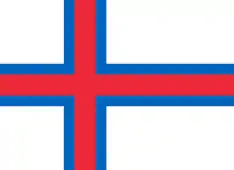 Faroe Islands – Faroese publication Portal reported on 9 June 2015 that Kringvarp Føroya (KVF) had applied for active EBU membership, a requisite for participation in the contest. However, it was rejected due to the islands' membership of the Danish Realm. Faroese Education Minister Bjørn Kalsø supported participation, saying "the justification so far has been that the countries have to be acknowledged by the United Nations as independent in order to participate. But there is no doubt that we could easily overstep those barriers, if we’re absolutely determined to reach this goal … it is completely up to Kringvarpið … to renew the application regularly, and show the EBU that the Faroe Islands are an equal match to other countries when it comes to participation in the Eurovision Song Contest."[95][96]
Faroe Islands – Faroese publication Portal reported on 9 June 2015 that Kringvarp Føroya (KVF) had applied for active EBU membership, a requisite for participation in the contest. However, it was rejected due to the islands' membership of the Danish Realm. Faroese Education Minister Bjørn Kalsø supported participation, saying "the justification so far has been that the countries have to be acknowledged by the United Nations as independent in order to participate. But there is no doubt that we could easily overstep those barriers, if we’re absolutely determined to reach this goal … it is completely up to Kringvarpið … to renew the application regularly, and show the EBU that the Faroe Islands are an equal match to other countries when it comes to participation in the Eurovision Song Contest."[95][96]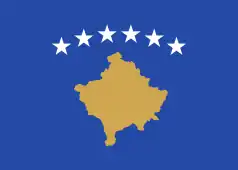 Kosovo – Kosovan Deputy Minister of Foreign Affairs Petrit Selimi tweeted on 23 May 2015 that Kosovo, which is not recognised by 15 states in Europe and does not have a national broadcaster with active EBU membership, would debut at the contest. Selimi tweeted that he knew that Kosovo would participate, but did not elaborate on how it would come about.[97] However, on 3 June, the EBU denied that Kosovo would debut at the contest, as Radio Televizioni i Kosovës (RTK) has neither active nor associate EBU membership.[94]
Kosovo – Kosovan Deputy Minister of Foreign Affairs Petrit Selimi tweeted on 23 May 2015 that Kosovo, which is not recognised by 15 states in Europe and does not have a national broadcaster with active EBU membership, would debut at the contest. Selimi tweeted that he knew that Kosovo would participate, but did not elaborate on how it would come about.[97] However, on 3 June, the EBU denied that Kosovo would debut at the contest, as Radio Televizioni i Kosovës (RTK) has neither active nor associate EBU membership.[94]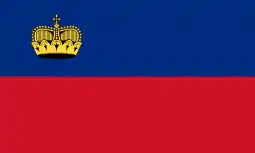 Liechtenstein – 1 Fürstentum Liechtenstein Television (1FLTV) announced on 16 September 2015 that Liechtenstein would be unable to debut at the contest due to insufficient funding for EBU membership.[98]
Liechtenstein – 1 Fürstentum Liechtenstein Television (1FLTV) announced on 16 September 2015 that Liechtenstein would be unable to debut at the contest due to insufficient funding for EBU membership.[98]
Incidents
Romanian disqualification
Romania's participation was reported to be in danger on 19 April 2016 due to repeated non-payment of debts by Televiziunea Română (TVR) to the EBU, totalling CHF 16 million (€14.56 million) dating back to January 2007.[99][100] The EBU had requested the Romanian government to repay the debt before 20 April or face exclusion from the contest. The EBU announced on 22 April that after the Romanian government had failed to repay the debt by the deadline, TVR were expelled from the EBU, consequently disqualifying Romania from the contest.[101][102] The Director General of the EBU, Ingrid Deltenre, said that while "it is regrettable that we are forced to take this action […] The continued indebtedness of TVR jeopardizes the financial stability of the EBU itself".[103]
However, because the official album of the contest had been produced before the disqualification, the planned Romanian entry, "Moment of Silence", performed by Ovidiu Anton, would remain on both digital and physical copies of the album.[54] The song had been written following the Colectiv nightclub fire in October 2015.[104]
German artist replacement
Norddeutscher Rundfunk (NDR) announced on 19 November 2015 that Xavier Naidoo would represent Germany in the contest. However, his selection was criticised due to his history of expressing far-right political views in his actions and lyrics, including a speech made at a protest in 2014 supporting the assertion that the German Reich continues to exist within its pre-World War II borders, his propagation of conspiracy theories surrounding the September 11 attacks and the 2008 financial crisis, and a song in which he referred to Baron Rothschild as "Baron Deadschild" and a "schmuck", as well as a collaboration with Kool Savas titled "Wo sind sie jetzt?", which contained homophobic lyrics which were interpreted as associating homosexuality with paedophilia. Critics of his selection included Johannes Kahrs, who branded the decision "unspeakable and embarrassing", the Amadeu Antonio Foundation and Bild.[105][106][107][108]
In light of the negative response and the need to quickly decide a new selection process, NDR withdrew its proposal to send Naidoo on 21 November. ARD co-ordinator Thomas Schreiber stated that "Xavier Naidoo is a brilliant singer who is, according to my own opinion, neither racist nor homophobe. It was clear that his nomination would polarise opinions, but we were surprised about the negative response. The Eurovision Song Contest is a fun event, in which music and the understanding between European people should be the focus. This characteristic must be kept at all costs."[106][109]
Russian jury votes
The EBU announced on 10 May 2016 that they were investigating reports of possible rule violations after Russian jury member Anastasia Stotskaya streamed footage of the Russian jury deliberation during the dress rehearsal of the first semi-final on 9 May on the live-streaming social media site Periscope.[110] The video showed one jury member not paying attention to the Dutch performance, while another jury member was filmed during the Armenian performance stating that she will support Armenia "because [her] husband is Armenian". The video also shows jury members on their phones during other performances, as well as a glimpse of Stotskaya's voting result, which also included notes evaluating performances. The rules of the contest stipulate that all jury members are to evaluate performances individually, without discussing the results with other jury members, a stipulation that was clearly violated by the Russian jury.[111]
The EBU released a statement later on 10 May, stating that following talks with Russia-1, the broadcaster proposed to withdraw Stotskaya, declaring her voting results to be invalid, and provide a replacement judge for the final on 14 May. The statement also clarified that the other four jury members submitted a valid jury vote. The EBU also stated that while streaming a video online from the jury deliberation is not considered to be a breach of the rules of the contest, so long as individual rankings, combined rankings or jury points are kept confidential until after the final, it regards Stotskaya's actions "as not in keeping with the spirit of the contest and potentially prejudicial as it imposes a potential risk of accidentally revealing results".[112]
Protests over official flag policy
In ensuring the apolitical nature of the contest and the safety of attendees, the EBU released an official flag policy on 29 April 2016, which included a list of flags which would be banned from the three live shows. The President of the Basque Country, Iñigo Urkullu, and the Spanish Minister for Foreign Affairs and Cooperation, José Manuel García-Margallo, protested at the specific inclusion of the flag of the Basque Country alongside other flags such as those of some unrecognised nations and the Islamic State, and called on the organisers of the contest to rectify the issue.[113][114] Radiotelevisión Española (RTVE) also expressed their concern to the EBU and requested a rectification,[115] with the EBU responding, saying that while the flag of the Basque Country is not specifically forbidden, it is an example of a banned flag, adding that only the "official national flags of the 42 participating countries, or from one of the countries that have recently taken part", "official national flags of any of the other United Nations member states", the flag of Europe and the rainbow flag were permitted.[116][117]
The EBU issued a statement later on 29 April, clarifying that it was not their intention to publish such a document, while acknowledging that the decision to publish a selection of flags of organisations and territories, each of which were "of a very different nature", was an insensitive one, and apologised for any offence caused by the publication of the original flag policy. The EBU also called on both the Ericsson Globe and the contest's official ticketing partner AXS to publish an updated flag policy which did not include examples of banned flags.[115]
The EBU released another statement on 6 May, stating that after discussing the matter with several participating delegations, the organisers of the contest had "agreed to relax the flag policy, and to allow national, regional and local flags of the participants" such as the Welsh flag (as Joe Woolford, representing the United Kingdom as part of Joe and Jake, is Welsh) and the Sami flag (as Agnete, representing Norway, is of Sami heritage), as well as the flags of all UN member states, the flag of the EU and the rainbow flag, as stated in the original flag policy. The EBU also proposed a more tolerant approach to other flags as long as attendees respect the apolitical nature of the contest and do not attempt to deliberately obstruct the camera views. Such a proposal was approved by the contest's Reference Group.[118][119][120]
The Spanish Embassy in Stockholm filed a formal complaint to Swedish police on 15 May after a Spanish citizen carrying the flag of the Basque Country had his flag confiscated by security personnel and was asked along with two of his compatriots to leave the venue. After an urgent intervention by the Spanish Consul, who was present in the arena, the flag was returned to the attendees and they were permitted to return to the venue.[121]
Nagorno-Karabakh flag dispute
Despite the official flag policy published by the EBU allowing only "national, regional and local flags of the participants" and banning the flag of the Nagorno-Karabakh Republic,[122] during the first voting recap of the first semi-final on 10 May, Armenian artist Iveta Mukuchyan was filmed in the green room holding the flag of the Nagorno-Karabakh Republic, sparking condemnation from the Azerbaijani press.[123][124] The situation further escalated during the semi-final qualifiers' press conference afterwards, where a member of the Azerbaijani press criticised the Armenian delegation and the EBU for allowing the flag to be shown during the show.[125] Responding to a question on the incident from a journalist from Aftonbladet, Mukuchyan stated: "My thoughts are with my Motherland. I want peace everywhere."[126] Commenting on the situation, Azerbaijani artist Samra Rahimli stated that "Eurovision is a song contest and it's all about music."[127]
The EBU and the contest's Reference Group released a joint statement on 11 May, strongly condemning Mukuchyan's actions during the first voting recap of the first semi-final and considering it "harmful" to the overall image of the contest. The Reference Group consequently sanctioned Public Television of Armenia (AMPTV), citing a breach of the rule stating that "no messages promoting any organisation, institution, political cause or other causes shall be allowed in the shows". Furthermore, the Reference Group has pointed out that a further breach of the rules of the contest could lead to disqualification from the contest or future contests.[128] The spokesman for the Azerbaijani Ministry of Foreign Affairs, Hikmet Hajiyev, called Mukuchyan's actions "provocative" and unacceptable, claiming that "the Armenian side deliberately resorts to such steps to encourage and promote the illegal formation created in the occupied Azerbaijani territories".[129]
Russian protests on Crimean Tatars flag
The winning song is about the deportation of the Crimean Tatars in 1944 and particularly about the singer's great-grandmother, who lost her daughter while being deported to Central Asia.[130][131][132] Jamala's song was considered by Russian media and lawmakers to be critical of the Russian annexation of Crimea in 2014 and the "ongoing war between Russia and Ukraine" in Donbass.[133][134]
Danish jury result
BT revealed on 15 May 2016 that Danish professional jury member Hilda Heick, wife of Keld Heick who co-wrote eight Danish entries, had submitted her ranking for the final and the semifinal 2 the wrong way round,[135] ranking her favourite entry 26th while ranking her least-favourite entry first, in direct opposition to what she had intended to do.[136] As a result of Heick's mistake, the points of the Danish jury would have been different:[137]
- Instead of 10 points, Australia would have received 12.
- Instead of 7 points, the Netherlands would have received 10.
- Instead of 5 points, Lithuania would have received 1.
- Instead of 4 points, Sweden would have received 7.
- Instead of 2 points, Israel would have received 4.
- Instead of 1 point, Spain would have received 5.
- Instead of not receiving points at all, France and Russia would have received 2 and 3 points respectively.
The United Kingdom and Ukraine both would have failed to receive any points from the Danish jury. While the overall result was not affected, the margin between second-placed Australia and first-placed Ukraine would have been reduced from 23 points to nine.[138]
Petition
A petition was started on Change.org on 15 May 2016 calling on the EBU and the contest's organisers to void the final results in view of the fact that the overall winner only placed second in both the jury and televote.[139] The EBU responded that Ukraine "is, and will remain, the winner" of the contest, and that the result was "valid in accordance with the rules".[140]
Controversy over winning song release date
A video surfaced depicting Ukrainian Eurovision winner Jamala performing 1944 four months before the eligibility date for prior commercial releases. However, the European Broadcasting Union "concluded that the song was eligible to compete", citing past relaxations of the rule.[141]
Other awards
The Marcel Bezençon Awards, the OGAE voting poll and the Barbara Dex Awards are awards that were contested by the entries competing at the Eurovision Song Contest 2016, in addition to the main winner's trophy.
Marcel Bezençon Awards
The Marcel Bezençon Awards were first handed out during the Eurovision Song Contest 2002 in Tallinn, Estonia, honouring the best competing songs in the final. Founded by Christer Björkman (Sweden's representative in the 1992 Eurovision Song Contest and the current Head of Delegation for Sweden) and Richard Herrey (a member of the Herreys and the Eurovision Song Contest 1984 winner from Sweden), the awards are named after the creator of the annual competition, Marcel Bezençon.[142] The awards were divided into three categories: Press Award, Artistic Award, and Composer Award. The winners were revealed shortly before the final on 14 May.[143]
| Category | Country | Song | Performer(s) | Composer(s) |
|---|---|---|---|---|
| Artistic Award | "1944" | Jamala | Jamala | |
| Composer Award | "Sound of Silence" | Dami Im | Anthony Egizii, David Musumeci | |
| Press Award | "You Are the Only One" | Sergey Lazarev | Philipp Kirkorov, Dimitris Kontopoulos, John Ballard, Ralph Charlie |
OGAE
Organisation Générale des Amateurs de l'Eurovision (more commonly known as OGAE) is an international organisation that was founded in 1984 in Savonlinna, Finland by Jari-Pekka Koikkalainen.[144] The organisation consists of a network of over 40 Eurovision Song Contest fan clubs across Europe and beyond, and is a non-governmental, non-political, and non-profit company.[145] In what has become an annual tradition for the OGAE fan clubs, a voting poll runs prior to the main Eurovision Song Contest allowing members from over 40 clubs to vote for their favourite songs of the 2016 contest. The 2016 OGAE Poll began on 4 April 2016 and finished on 2 May 2016. The table below shows the top 5 results.[146]
| Country | Performer(s) | Song | OGAE result[147] |
|---|---|---|---|
| Amir | "J'ai cherché" | 425 | |
| Sergey Lazarev | "You Are the Only One" | 392 | |
| Dami Im | "Sound of Silence" | 280 | |
| Poli Genova | "If Love Was a Crime" | 175 | |
| Francesca Michielin | "No Degree of Separation" | 170 |
*Table reflects the final voting result from the 45 OGAE member clubs, with two clubs (OGAE Bulgaria and OGAE Moldova) abstaining from voting in this 2016 poll.
Barbara Dex Award
The Barbara Dex Award was annually awarded by the fan website House of Eurovision since 1997, and is a humorous award given to the worst dressed artist each year in the contest. It is named after the Belgian artist, Barbara Dex, who came last in the 1993, in which she wore her own self designed dress. After twenty editions, 2016 ended up being the final edition that the Barbara Dex Award was organised by House of Eurovision,[148] as they handed the reins to another website, songfestival.be not long after the contest.
| Place[149] | Country[149] | Performer(s)[149] | Votes[149] |
|---|---|---|---|
| 1 | Nina Kraljić | 770 | |
| 2 | Jamie Lee | 335 | |
| 3 | Rykka | 201 | |
| 4 | Poli Genova | 140 | |
| 5 | Dalal & Deen feat. Ana Rucner and Jala | 127 | |
International broadcasts and voting
It was reported by the EBU that the contest was viewed by a worldwide television audience of over 200 million viewers,[150][151] beating the 2015 record which was viewed by 197 million.[152]
Voting and spokespersons
The spokespersons announced the 12-point score from their respective country's national jury in the following order:[153]
 Austria – Kati Bellowitsch
Austria – Kati Bellowitsch Iceland – Unnsteinn Manúel Stefánsson
Iceland – Unnsteinn Manúel Stefánsson Azerbaijan – Tural Asadov
Azerbaijan – Tural Asadov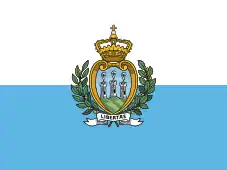 San Marino – Irol MC
San Marino – Irol MC Czech Republic – Daniela Písařovicová
Czech Republic – Daniela Písařovicová Ireland – Sinéad Kennedy
Ireland – Sinéad Kennedy Georgia – Nina Sublatti (Georgian representative in 2015)
Georgia – Nina Sublatti (Georgian representative in 2015)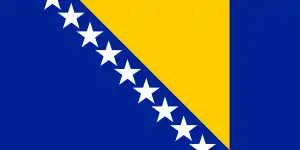 Bosnia and Herzegovina – Ivana Crnogorac
Bosnia and Herzegovina – Ivana Crnogorac Malta – Ben Camille (Co-presenter of the Junior Eurovision Song Contest 2016)
Malta – Ben Camille (Co-presenter of the Junior Eurovision Song Contest 2016) Spain – Jota Abril
Spain – Jota Abril Finland – Jussi-Pekka Rantanen
Finland – Jussi-Pekka Rantanen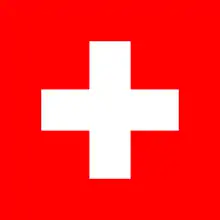 Switzerland – Sebalter (Swiss representative in 2014)
Switzerland – Sebalter (Swiss representative in 2014) Denmark – Ulla Essendrop
Denmark – Ulla Essendrop France – Élodie Gossuin
France – Élodie Gossuin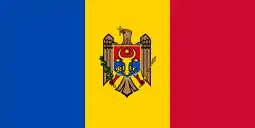 Moldova – Olivia Furtună
Moldova – Olivia Furtună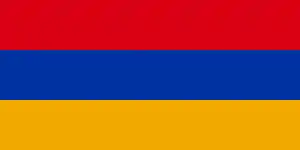 Armenia – Arman Margaryan
Armenia – Arman Margaryan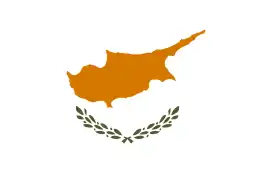 Cyprus – Loukas Hamatsos
Cyprus – Loukas Hamatsos Bulgaria – Anna Angelova
Bulgaria – Anna Angelova Netherlands – Trijntje Oosterhuis (Dutch representative in 2015)
Netherlands – Trijntje Oosterhuis (Dutch representative in 2015) Latvia – Toms Grēviņš
Latvia – Toms Grēviņš Israel – Ofer Nachshon
Israel – Ofer Nachshon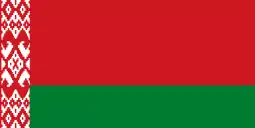 Belarus – Uzari (Belarusian representative in 2015)
Belarus – Uzari (Belarusian representative in 2015) Germany – Barbara Schöneberger
Germany – Barbara Schöneberger Russia – Nyusha
Russia – Nyusha Norway – Elisabeth Andreassen (Norwegian representative in 1985, 1994 and 1996 contest; winner of the 1985 contest as part of Bobbysocks!; Swedish representative in the 1982 as part of Chips)
Norway – Elisabeth Andreassen (Norwegian representative in 1985, 1994 and 1996 contest; winner of the 1985 contest as part of Bobbysocks!; Swedish representative in the 1982 as part of Chips).svg.png.webp) Australia – Lee Lin Chin
Australia – Lee Lin Chin.svg.png.webp) Belgium – Umesh Vangaver
Belgium – Umesh Vangaver United Kingdom – Richard Osman
United Kingdom – Richard Osman Croatia – Nevena Rendeli
Croatia – Nevena Rendeli Greece – Constantinos Christoforou (Cypriot representative in 1996, 2002 as part of One and in 2005)
Greece – Constantinos Christoforou (Cypriot representative in 1996, 2002 as part of One and in 2005) Lithuania – Ugnė Galadauskaitė
Lithuania – Ugnė Galadauskaitė Serbia – Dragana Kosjerina
Serbia – Dragana Kosjerina Macedonia – Dijana Gogova
Macedonia – Dijana Gogova Albania – Andri Xhahu
Albania – Andri Xhahu Estonia – Daniel Levi Viinalass
Estonia – Daniel Levi Viinalass Ukraine – Verka Serduchka (Ukrainian representative in 2007)
Ukraine – Verka Serduchka (Ukrainian representative in 2007) Italy – Claudia Andreatti
Italy – Claudia Andreatti Poland – Anna Popek
Poland – Anna Popek Slovenia – Marjetka Vovk (Slovenian representative in 2015 as part of Maraaya)
Slovenia – Marjetka Vovk (Slovenian representative in 2015 as part of Maraaya) Hungary – Csilla Tatár
Hungary – Csilla Tatár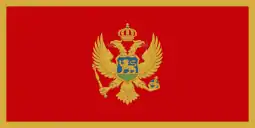 Montenegro – Danijel Alibabić (Serbia and Montenegro representative in 2005 as part of No Name)
Montenegro – Danijel Alibabić (Serbia and Montenegro representative in 2005 as part of No Name) Sweden – Gina Dirawi
Sweden – Gina Dirawi
Commentators
Most countries sent commentators to Stockholm or commentated from their own country, in order to add insight to the participants and, if necessary, the provision of voting information.
 Albania – Andri Xhahu (TVSH, RTSH HD, RTSH Muzikë and Radio Tirana, all shows)[154][155]
Albania – Andri Xhahu (TVSH, RTSH HD, RTSH Muzikë and Radio Tirana, all shows)[154][155] Armenia – Avet Barseghyan (Armenia 1 and Public Radio of Armenia, all shows)[156][157]
Armenia – Avet Barseghyan (Armenia 1 and Public Radio of Armenia, all shows)[156][157].svg.png.webp) Australia – Julia Zemiro and Sam Pang (SBS and SBS Radio 4, all shows)[158][159]
Australia – Julia Zemiro and Sam Pang (SBS and SBS Radio 4, all shows)[158][159] Austria – Andi Knoll (ORF eins, all shows)[160]
Austria – Andi Knoll (ORF eins, all shows)[160] Azerbaijan – Azər Süleymanlı (İTV, all shows)[161][162]
Azerbaijan – Azər Süleymanlı (İTV, all shows)[161][162] Belarus – Evgeny Perlin (Belarus-1 and Belarus 24, all shows)[163]
Belarus – Evgeny Perlin (Belarus-1 and Belarus 24, all shows)[163].svg.png.webp) Belgium – Dutch: Peter Van de Veire (één, all shows);[164] French: Jean-Louis Lahaye and Maureen Louys (La Une, all shows)[165][166]
Belgium – Dutch: Peter Van de Veire (één, all shows);[164] French: Jean-Louis Lahaye and Maureen Louys (La Une, all shows)[165][166] Bosnia and Herzegovina – Dejan Kukrić (BHT 1, BHT HD and BH Radio 1, all shows)[167]
Bosnia and Herzegovina – Dejan Kukrić (BHT 1, BHT HD and BH Radio 1, all shows)[167] Bulgaria – Elena Rosberg and Georgi Kushvaliev (BNT 1 and BNT HD, all shows)[168][169]
Bulgaria – Elena Rosberg and Georgi Kushvaliev (BNT 1 and BNT HD, all shows)[168][169] Croatia – Duško Čurlić (HRT 1, all shows); Zlatko Turkalj Turki (HR 2, all shows)[170]
Croatia – Duško Čurlić (HRT 1, all shows); Zlatko Turkalj Turki (HR 2, all shows)[170] Cyprus – Melina Karageorgiou (RIK 1, RIK SAT, RIK HD and Trito Programma, all shows)[171]
Cyprus – Melina Karageorgiou (RIK 1, RIK SAT, RIK HD and Trito Programma, all shows)[171] Czech Republic – Libor Bouček (ČT2, semi-finals; ČT1, final)[172]
Czech Republic – Libor Bouček (ČT2, semi-finals; ČT1, final)[172] Denmark – Ole Tøpholm (DR1, all shows)[173]
Denmark – Ole Tøpholm (DR1, all shows)[173] Estonia – Estonian: Marko Reikop (ETV, all shows);[174] Mart Juur and Andrus Kivirähk (Raadio 2, first semi-final and final);[175] Russian: Aleksandr Hobotov (ETV+, all shows)[176]
Estonia – Estonian: Marko Reikop (ETV, all shows);[174] Mart Juur and Andrus Kivirähk (Raadio 2, first semi-final and final);[175] Russian: Aleksandr Hobotov (ETV+, all shows)[176] Finland – Finnish: Mikko Silvennoinen (Yle TV2 and TV Finland, all shows);[177][178] Sanna Pirkkalainen and Jorma Hietamäki (Yle Radio Suomi, all shows);[179] Swedish: Eva Frantz and Johan Lindroos (Yle TV2, TV Finland, Yle Radio Vega, all shows)[180]
Finland – Finnish: Mikko Silvennoinen (Yle TV2 and TV Finland, all shows);[177][178] Sanna Pirkkalainen and Jorma Hietamäki (Yle Radio Suomi, all shows);[179] Swedish: Eva Frantz and Johan Lindroos (Yle TV2, TV Finland, Yle Radio Vega, all shows)[180] France – Marianne James and Jarry (France 4, semi-finals); Marianne James and Stéphane Bern (France 2, final)[181]
France – Marianne James and Jarry (France 4, semi-finals); Marianne James and Stéphane Bern (France 2, final)[181] Georgia – Tuta Chkheidze and Nika Katsia (GPB First Channel, all shows)[182][183]
Georgia – Tuta Chkheidze and Nika Katsia (GPB First Channel, all shows)[182][183] Germany – Peter Urban (EinsFestival and Phoenix, semi-finals; Das Erste, final)[184][185]
Germany – Peter Urban (EinsFestival and Phoenix, semi-finals; Das Erste, final)[184][185] Greece – Maria Kozakou and Giorgos Kapoutzidis (ERT1, ERT HD, ERT World, ERA 2 and Voice of Greece, all shows)[186]
Greece – Maria Kozakou and Giorgos Kapoutzidis (ERT1, ERT HD, ERT World, ERA 2 and Voice of Greece, all shows)[186] Hungary – Gábor Gundel Takács (Duna, all shows)[187]
Hungary – Gábor Gundel Takács (Duna, all shows)[187] Iceland – Gísli Marteinn Baldursson (RÚV and Rás 2, all shows)[188]
Iceland – Gísli Marteinn Baldursson (RÚV and Rás 2, all shows)[188] Ireland – Marty Whelan (RTÉ2, semi-finals; RTÉ One, final); Neil Doherty and Zbyszek Zalinski (RTÉ Radio 1, second semi-final and final)[189]
Ireland – Marty Whelan (RTÉ2, semi-finals; RTÉ One, final); Neil Doherty and Zbyszek Zalinski (RTÉ Radio 1, second semi-final and final)[189] Israel – Hebrew: Subtitles (Channel 1, second semi-final and final (live), first semi-final (delayed)); Kobi Menora, Or Vaxman and Nancy Brandes (88 FM, second semi-final and final); Arabic: Subtitles (Channel 33, second semi-final and final)[190][191]
Israel – Hebrew: Subtitles (Channel 1, second semi-final and final (live), first semi-final (delayed)); Kobi Menora, Or Vaxman and Nancy Brandes (88 FM, second semi-final and final); Arabic: Subtitles (Channel 33, second semi-final and final)[190][191] Italy – Filippo Solibello and Marco Ardemagni (Rai 4, semi-finals; Rai Radio 2, all shows);[192] Flavio Insinna and Federico Russo (Rai 1, final)[193][194]
Italy – Filippo Solibello and Marco Ardemagni (Rai 4, semi-finals; Rai Radio 2, all shows);[192] Flavio Insinna and Federico Russo (Rai 1, final)[193][194] Latvia – Valters Frīdenbergs (LTV1, all shows); Toms Grēviņš (LTV1, final)[195][196]
Latvia – Valters Frīdenbergs (LTV1, all shows); Toms Grēviņš (LTV1, final)[195][196] Lithuania – Darius Užkuraitis (LRT, LRT HD and LRT Radijas, all shows)[197]
Lithuania – Darius Užkuraitis (LRT, LRT HD and LRT Radijas, all shows)[197] Macedonia – Karolina Petkovska (MRT 1, all shows)[198]
Macedonia – Karolina Petkovska (MRT 1, all shows)[198] Malta – Arthur Caruana (TVM, all shows)[199][200]
Malta – Arthur Caruana (TVM, all shows)[199][200] Moldova – Gloria Gorceag (Moldova 1, Radio Moldova, Radio Moldova Muzical and Radio Moldova Tineret, all shows)[201][202]
Moldova – Gloria Gorceag (Moldova 1, Radio Moldova, Radio Moldova Muzical and Radio Moldova Tineret, all shows)[201][202] Montenegro – Dražen Bauković and Tijana Mišković (TVCG 1 and TVCG SAT, all shows)[203][204]
Montenegro – Dražen Bauković and Tijana Mišković (TVCG 1 and TVCG SAT, all shows)[203][204] Netherlands - Jan Smit and Cornald Maas (NPO 1 and BVN, all shows);[205][206] Douwe Bob (NPO 1 and BVN, second semi-final)[207]
Netherlands - Jan Smit and Cornald Maas (NPO 1 and BVN, all shows);[205][206] Douwe Bob (NPO 1 and BVN, second semi-final)[207] Norway – Olav Viksmo-Slettan (NRK1, all shows);[208] Ronny Brede Aase, Silje Reiten Nordnes and Markus Ekrem Neby (NRK3, final);[209] Ole Christian Øen (NRK P1, second semi-final and final)[210]
Norway – Olav Viksmo-Slettan (NRK1, all shows);[208] Ronny Brede Aase, Silje Reiten Nordnes and Markus Ekrem Neby (NRK3, final);[209] Ole Christian Øen (NRK P1, second semi-final and final)[210] Poland – Artur Orzech (TVP 1 and TVP Polonia (live); TVP Rozrywka and TVP HD (one-day delay), all shows)[211]
Poland – Artur Orzech (TVP 1 and TVP Polonia (live); TVP Rozrywka and TVP HD (one-day delay), all shows)[211] Russia – Dmitry Guberniev and Ernest Mackevičius (Russia-1 and Russia HD, all shows)[212]
Russia – Dmitry Guberniev and Ernest Mackevičius (Russia-1 and Russia HD, all shows)[212] San Marino – Lia Fiorio and Gigi Restivo (SMtv San Marino and Radio San Marino, all shows)[213]
San Marino – Lia Fiorio and Gigi Restivo (SMtv San Marino and Radio San Marino, all shows)[213] Serbia – Dragan Ilić (RTS 1, RTS HD and RTS Sat, first semi-final); Duška Vučinić (RTS 1, RTS HD and RTS Sat, second semi-final and final)[214][215][216]
Serbia – Dragan Ilić (RTS 1, RTS HD and RTS Sat, first semi-final); Duška Vučinić (RTS 1, RTS HD and RTS Sat, second semi-final and final)[214][215][216] Slovenia – Andrej Hofer (RTV SLO2, semi-finals; RTV SLO1, final; Radio Val 202, second semi-final and final; Radio Maribor, all shows)[217]
Slovenia – Andrej Hofer (RTV SLO2, semi-finals; RTV SLO1, final; Radio Val 202, second semi-final and final; Radio Maribor, all shows)[217] Spain – José María Íñigo and Julia Varela (La 2, semi-finals; La 1, final)[218]
Spain – José María Íñigo and Julia Varela (La 2, semi-finals; La 1, final)[218] Sweden – Lotta Bromé (SVT1, all shows);[219] Carolina Norén and Björn Kjellman (SR P4, all shows)[220]
Sweden – Lotta Bromé (SVT1, all shows);[219] Carolina Norén and Björn Kjellman (SR P4, all shows)[220] Switzerland – German: Sven Epiney (SRF zwei, semi-finals; SRF 1, final); Peter Schneider and Gabriel Vetter (SRF 1 and Radio SRF 3, final)[221] French: Jean-Marc Richard and Nicolas Tanner (RTS Deux, second semi-final and final);[222] Italian: Clarissa Tami (RSI La 2, second semi-final);[223] Clarissa Tami and Michele "Cerno" Carobbio (RSI La 1, final)[224]
Switzerland – German: Sven Epiney (SRF zwei, semi-finals; SRF 1, final); Peter Schneider and Gabriel Vetter (SRF 1 and Radio SRF 3, final)[221] French: Jean-Marc Richard and Nicolas Tanner (RTS Deux, second semi-final and final);[222] Italian: Clarissa Tami (RSI La 2, second semi-final);[223] Clarissa Tami and Michele "Cerno" Carobbio (RSI La 1, final)[224] Ukraine – Timur Miroshnychenko and Tetiana Terekhova (UA:Pershyi, all shows);[225] Olena Zelinchenko (Radio Ukraine, all shows)[226]
Ukraine – Timur Miroshnychenko and Tetiana Terekhova (UA:Pershyi, all shows);[225] Olena Zelinchenko (Radio Ukraine, all shows)[226] United Kingdom – Scott Mills and Mel Giedroyc (BBC Four, semi-finals); Graham Norton (BBC One, final); Ken Bruce (BBC Radio 2, final)[227][228]
United Kingdom – Scott Mills and Mel Giedroyc (BBC Four, semi-finals); Graham Norton (BBC One, final); Ken Bruce (BBC Radio 2, final)[227][228]
Non-participating countries
 China – Kubert Leung and Wu Zhoutong (Hunan TV, all shows)[229]
China – Kubert Leung and Wu Zhoutong (Hunan TV, all shows)[229] Kazakhstan – Diana Snegina and Kaldybek Zhaysanbay (Khabar, all shows)[230]
Kazakhstan – Diana Snegina and Kaldybek Zhaysanbay (Khabar, all shows)[230] Kosovo – TBA (RTK, all shows)[231]
Kosovo – TBA (RTK, all shows)[231] New Zealand – Graham Norton (BBC UKTV, final)[232]
New Zealand – Graham Norton (BBC UKTV, final)[232] Portugal – Hélder Reis and Nuno Galopim (RTP, all shows)[233][234][235][236]
Portugal – Hélder Reis and Nuno Galopim (RTP, all shows)[233][234][235][236] Slovakia – TBA (RTVS, final)[237]
Slovakia – TBA (RTVS, final)[237] United States – Carson Kressley and Michelle Collins (Logo TV, final)[238][239]
United States – Carson Kressley and Michelle Collins (Logo TV, final)[238][239]
International sign broadcast
SVT announced on 22 April 2016 that they would offer International Sign broadcasts of all three live shows for the hearing impaired. All three broadcasts were produced by Julia Kankkonen.[240] The performances of competing entries were interpreted by ten sign language performers and the dialogue of hosts were interpreted by three sign language performers:[241][242][243]
- Markus Aro (Finland)
- Ebru Bilen Basaran (Denmark)
- Vivien Batory (Denmark)
- Laith Fathulla (Sweden)
- Rafael-Evitan Grombelka (Germany)
- Amadeus Lantz (Sweden)
- Georg Marsh (Austria)
- Amina Ouahid (Sweden)
- Tommy Rangsjö (Sweden)
- Pavel Rodionov (Russia)
- Laura Levita Valytė (Lithuania)
- Kolbrún Völkudóttir (Iceland)
- Xuejia Rennie Zacsko (Sweden)
The international sign broadcasts was streamed online alongside the three live shows,[241] with the following countries also televising the broadcasts:
 Austria – ORF 2 (final)[244]
Austria – ORF 2 (final)[244] Denmark – DR Ramasjang (all shows)[245]
Denmark – DR Ramasjang (all shows)[245] Lithuania – LRT Kultūra (all shows)[246]
Lithuania – LRT Kultūra (all shows)[246] Norway – NRK Tegnspråk (all shows)[247]
Norway – NRK Tegnspråk (all shows)[247] Sweden – SVT24 (all shows)[241]
Sweden – SVT24 (all shows)[241]
Official album
| Eurovision Song Contest: Stockholm 2016 | ||||
|---|---|---|---|---|
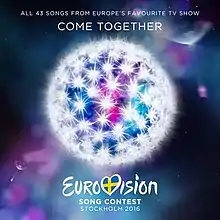 | ||||
| Compilation album by | ||||
| Released | 15 April 2016 | |||
| Genre | Pop | |||
| Length |
| |||
| Label | Universal | |||
| Eurovision Song Contest chronology | ||||
| ||||
Eurovision Song Contest: Stockholm 2016 is the official compilation album of the contest, put together by the European Broadcasting Union and was released by Universal Music Group digitally on 15 April and physically on 22 April 2016.[248] The album features all 42 participating entries, including the semi-finalists that fail to qualify for the final.[249] The album also features the disqualified Romanian entry, meaning that the tracks on the CD are actually 43.[54]
Charts
| Chart (2016) | Peak position |
|---|---|
| {{{2}}}[[Category:Album chart usages for {{{1}}}]] | |
| {{{2}}}[[Category:Album chart usages for {{{1}}}]] | |
| Finnish Albums (Suomen virallinen lista)[250] | 10 |
| {{{2}}}[[Category:Album chart usages for {{{1}}}]] | |
| German Compilation Albums (Offizielle Top 100)[251] | 2 |
| Greek Albums (IFPI)[252] | 14 |
| {{{2}}}[[Category:Album chart usages for {{{1}}}]] | |
| {{{2}}}[[Category:Album chart usages for {{{1}}}]] | |
| UK Compilation Albums (OCC)[253] | 9 |
See also
| Wikimedia Commons has media related to Eurovision Song Contest 2016. |
Notes and references
Notes
- ^ Israel, who had been allocated to pot six, were pre-allocated to compete in the second semi-final as the first semi-final coincided with Yom Hazikaron.
- ^ Romania, who had been originally allocated to perform in the second semi-final, were forcefully withdrawn due to repeated non-payment of debts to the EBU.
- ^ The song contains some words in Pontic Greek, a dialect of Greek spoken in Northern Greece.[254]
References
- "Stockholm to host 2016 Eurovision Song Contest". Eurovision.tv. Retrieved 8 July 2015.
- Jiandani, Sanjay (1 June 2015). "Malmö to host Eurovision again?". esctoday,com. ESCToday. Retrieved 1 June 2015.
- Selåker, Johannes; Olausson, Mathilda (24 May 2015). "Här är arenan där SVT vill anordna Eurovision" [This is the arena where the SVT want to organize Eurovision]. Expressen (in Swedish). Retrieved 29 May 2015.
- Jiandani, Sanjay (26 May 2015). "Preparations in full swing in Sweden". esctoday.com. Retrieved 29 May 2015.
- Granger, Anthony (8 July 2015). "ESC'16: Stockholm To Host Eurovision 2016". eurovoix.com. Retrieved 8 July 2015.
- "Inget Eurovision på Ullevi" [No Eurovision at Ullevi]. Göteborgs-Posten (in Swedish). 12 June 2015. Archived from the original on 14 June 2015. Retrieved 13 June 2015.
- "ESC'16: Malmö Withdraws Its Bid To Host". eurovoix.com. 11 June 2015. Retrieved 11 June 2015.
- "Örnsköldsvik enters the race with Fjällräven Center". Retrieved 12 June 2015.
- "Eurovision Eurovision 2016: Sandviken enters the host city race with Göransson Arena!". Retrieved 2 June 2015.
- "ESC '16: Gävle & Sandviken Submit Joint Bid". Retrieved 9 June 2015.
- Xifaras, Billy (12 June 2015). "Eurovision 2016 Host City: Stockholm applies with Globen Area, not Friends Arena". wiwibloggs.com. Retrieved 12 June 2015.
- "Friends och Tele2 ute ur Eurovision-leken" [Friends and Tele2 out of the Eurovision-game]. Dagens Nyheter (in Swedish). 2 June 2015. Retrieved 5 July 2015.
- "Eurovision 2016: What do we know so far?". escdaily.com. 26 May 2015. Retrieved 26 June 2015.
- "Stockholm's Tele2 Arena to host Eurovision The Party". Eurovision.tv. Retrieved 15 March 2016.
- Corner, Natalie (24 May 2015). "When is Eurovision 2016? Date, location, entry details". Daily Mirror. Retrieved 24 May 2015.
- Brey, Marco (16 March 2015). "Heads of Delegations meet in Vienna". eurovision.tv. European Broadcasting Union. Retrieved 16 March 2015.
- Granger, Anthony (16 July 2015). "EBU to look at possibility of Asian guest star". eurovoix.com. Retrieved 8 August 2015.
- "SVT kapar Eurovisionbudget" [SVT cuts Eurovision Budget]. Dagens Nyheter (in Swedish). Retrieved 19 September 2015.
- "Public Rules of the 61st Eurovision Song Contest" (PDF). European Broadcasting Union. 28 October 2015. Archived from the original (PDF) on 22 January 2016. Retrieved 21 January 2016.
- "'Big Five' and host country more prominently in the Semi-Finals". Eurovision.tv. Retrieved 23 September 2015.
- Escudero, Victor M (26 October 2015). "Meet the core team for 2016". eurovision.tv. European Broadcasting Union. Retrieved 18 November 2015.
- Jordan, Paul (18 February 2016). "Biggest change to Eurovision Song Contest voting since 1975". eurovision.tv. Retrieved 18 February 2016.
- Norddeutscher Rundfunk (7 April 2016). "Barbara Schöneberger verliest ESC-Punkte" [ESC: Barbara Schöneberger is the Spokesperson]. eurovision.de (in German). Retrieved 7 April 2016.
Die Punkte für die Länder, die in der Zuschauer-Wertung die Plätze 11 bis 26 belegen, werden auf der Tafel eingeblendet. Die Top Ten des Publikums-Votings werden von den ESC-Moderatoren – in diesem Jahr Måns Zelmerlöw und Petra Mede – verkündet.
- "ESC 2016: Press Release: Serhat & San Marino go Disco in Stockholm!". SMTV San Marino. 27 February 2016. Retrieved 27 February 2016.
- Gallagher, Robin. "San Marino: SMRTV claims new voting system is "unacceptable"". Wiwibloggs. Wiwibloggs.com. Retrieved 27 February 2016.
- "Sanna Nielsen leder Mellon – vid sidan av". Expressen. Retrieved 14 March 2016.
- "Sanna Nielsens nya jobb under Eurovision" [Sanna Nielsen's new jobs over Eurovision]. Expressen (in Swedish). 14 March 2016. Retrieved 14 March 2016.
- Lindqvist, Anton (24 May 2015). "Måns Zelmerlöw öppnar för att leda Eurovision Song Contest 2016" [Mans Zelmerlöw opens for leading Eurovision 2016]. svt.se (in Swedish). Sveriges Television. Retrieved 24 May 2015.
- Linndqvist, Anton (21 November 2014). "Måns Zelmerlöw – Heroes". svt.se (in Swedish). Sveriges Television. Archived from the original on 9 May 2015. Retrieved 25 May 2015.
- Lindqvist, Anton (17 June 2013). "Följ med på Allsångshistoria" [Follow on song history]. svt.se (in Swedish). Sveriges Television. Retrieved 25 May 2015.
- Selåker, Johannes; Färsjö, Therese (24 May 2015). "Måns öppnar för nytt jobb efter ESC-succén" [Mans opens for a new job after the ESC success]. Expressen (in Swedish). Retrieved 25 May 2015.
- William Lee Adams. "Eurovision 2016: Dolph Lundgren to host alongside Måns Zelmerlöw". Eurovision 2015 Predictions, Polls, Odds, Rankings – wiwibloggs. Retrieved 2 June 2015.
- "SVT vill att Mede och Zelmerlöw leder ESC". Expressen. Retrieved 26 August 2015.
- "Petra Mede and Måns Zelmerlöw to host in Stockholm!". Eurovision.tv. Retrieved 14 December 2015.
- Albinsson, Mathilde (2 May 2016). "Få mer av Eurovision – se presskonferenserna live" [Get more out of Eurovision – watch the press conference live]. Sveriges Television (in Swedish). Retrieved 8 May 2016.
- Davies, Megan (19 April 2016). "Details of opening ceremony revealed". Eurovoix. Retrieved 8 May 2016.
- Jordan, Paul (21 January 2016). "Semi-Final Allocation Draw on Monday, pots revealed". Eurovision.tv. European Broadcasting Union. Retrieved 21 January 2016.
- Gallagher, Robyn (1 April 2016). "EBU confirms semi-final running order to be revealed on Tuesday". wiwibloggs.com. Wiwibloggs. Retrieved 1 April 2016.
- Van Eersel, Dennis (4 April 2016). "Eurovision 2016 running order revealed this Friday". ESCDaily. Retrieved 5 April 2016.
- Van Eersel, Dennis (23 December 2015). "Eurovision 2016: Semi-finals Allocation Draw on 25th of January". ESCDaily.com. Archived from the original on 25 December 2015. Retrieved 2 January 2016.
- "Allocation Draw: The results!". Eurovision.tv. Retrieved 25 January 2016.
- Kavaler, Ron (1 May 2016). "Eurovision 2016: Sneak peek of first rehearsals inside Globen Arena". wiwibloggs.com. Wiwibloggs. Retrieved 1 May 2016.
- Bayley, Matheson. "That's Eurovision – Music by Matheson Bayley, Lyric by Matheson Bayley, Edward af Sillén and Daniel Réhn". Archived from the original on 14 May 2016. Retrieved 13 May 2016.
- Albinsson, Mathilde (13 May 2016). "Så blir öppningsnumret i finalen av Eurovision 2016 – en hyllning till svensk design och dansmusik" [Here is the opening number for Eurovision 2016 - a tribute to Swedish design and house music]. svt.se (in Swedish). Sveriges Television. Retrieved 17 May 2016.
- Jordan, Paul (9 May 2016). "Justin Timberlake makes world premiere live performance in the Eurovision Song Contest!". eurovision.tv. European Broadcasting Union. Retrieved 9 May 2016.
- Vincent, Alice (15 May 2016). "Justin Timberlake was too slick and soulless at Eurovision - review". telegraph.co.uk. The Telegraph. Retrieved 15 May 2016.
- Ågrahn, Emma (12 May 2016). "Rybak, tanter och hamsterhjul – bombastiskt humornummer driver med Eurovision" [Rybak, grannies and hamster wheel - bombastic parody meets Eurovision]. svt.se (in Swedish). Sveriges Television. Retrieved 17 May 2016.
- Petterson, Emma (13 May 2016). "Så blir finalen i Eurovision Song Contest 2016 – minut för minut" [Here is the final of Eurovision Song Contest 2016 - minute by minute]. svt.se (in Swedish). Sveriges Television. Retrieved 14 May 2016.
- Qvist, Bella (12 May 2016). "How Eurovision finally cracked America". The Guardian. Guardian News and Media Limited. Retrieved 16 May 2016.
- "Eurovision Song Contest 2016 Grand Final". Eurovision Song Contest. Season 61. 15 May 2016. Event occurs at 02:17:36. Logo TV. Retrieved 16 May 2016.
- Lewis, Lisa Jayne (12 May 2016). "Justin Timberlake's Eurovision Performance WILL NOT Air in the USA!". eurovisionireland.com. Eurovision Ireland. Retrieved 17 May 2016.
- Jiandani, Sanjay (10 September 2015). "Stockholm 2016: How many countries will join us in Stockholm?". esctoday.com. Retrieved 11 September 2015.
- Jordan, Paul (26 November 2015). "43 countries represented in Stockholm!". eurovision.tv. European Broadcasting Union. Retrieved 26 November 2015.
- "TVR (Romania) no longer entitled to take part in Eurovision 2016". eurovision.tv. European Broadcasting Union. 22 April 2016. Retrieved 22 April 2016.
- Kiernan, Emma (9 June 2015). "Portuguese websites call for changes to Portugal's 2016 Eurovision selection". escreporter.com. Archived from the original on 21 July 2015. Retrieved 19 July 2015.
- "Deen i Dalal će predstavljati BiH na Eurosongu". klix.ba. Klix. 25 November 2015. Retrieved 25 November 2015.
- Jordan, Paul. "Kaliopi returns for FYR Macedonia!". eurovision.tv. Retrieved 24 November 2015.
- Brey, Marco (19 February 2016). "Bulgaria: Poli Genova returns to Eurovision". eurovision.tv. European Broadcasting Union. Retrieved 19 February 2016.
- Mario. "Montenegro: No Name member Bojan Jovovic joins Highway". Eurovision 2016 Predictions, Polls, Odds, Rankings | wiwibloggs. Retrieved 21 January 2016.
- "Ira Losco wins the 2016 Malta Eurovision Song Contest". tvm.com.mt. TVM. 23 January 2016. Retrieved 23 January 2016.
- Leon, Jakov (12 March 2016). "It's Donny Montell for Lithuania!". eurovision.tv. European Broadcasting Union. Retrieved 12 March 2016.
- Escudero, Victor (20 February 2016). "Greta Salome to represent Iceland!". eurovision.tv. European Broadcasting Union. Retrieved 20 February 2016.
- Granger, Anthony (23 September 2015). "ESC'16: Big 5 & Sweden Will Perform in the Semi Finals". eurovoix.com. Retrieved 23 September 2015.
- Roxburgh, Gordon (10 May 2016). "We have our first ten finalists". eurovision.tv. European Broadcasting Union. Retrieved 10 May 2016.
- Jordan, Paul (8 April 2016). "Running order of the Semi-Finals revealed". eurovision.tv. European Broadcasting Union. Retrieved 8 April 2016.
- "Eurovision Song Contest 2016 First Semi-Final". eurovision.tv. European Broadcasting Union. Retrieved 28 January 2016.
- "Eurovision Song Contest 2016 - First Semi-Final". Eurovision. Archived from the original on 13 May 2016. Retrieved 14 May 2016.
- Roxburgh, Gordon (12 May 2016). "10 more finalists through to the Grand Final". eurovision.tv. European Broadcasting Union. Retrieved 12 May 2016.
- "Eurovision Song Contest 2016 Second Semi-Final". eurovision.tv. European Broadcasting Union. Retrieved 28 January 2016.
- "Eurovision Song Contest 2016 - Second Semi-Final". Eurovision. Archived from the original on 13 May 2016. Retrieved 14 May 2016.
- Brey, Marco (13 May 2016). "Running order for the 2016 Grand Final revealed". Eurovision.tv. Retrieved 13 May 2016.
- "Eurovision Song Contest 2016 Grand Final". eurovision.tv. European Broadcasting Union. Retrieved 2 February 2016.
- "2016 First Semi-Final Scoreboard". Eurovision.tv. European Broadcasting Union. Retrieved 15 May 2016.
- "2016 Second Semi-Final Scoreboard". Eurovision.tv. European Broadcasting Union. Retrieved 15 May 2016.
- "2016 Grand Final Scoreboard". Eurovision.tv. European Broadcasting Union. Retrieved 14 May 2016.
- "Which countries? FAQs". eurovision.tv. EBU. Archived from the original on 22 May 2014. Retrieved 22 May 2014.
- Jiandani, Sanjay (2 September 2015). "Andorra: RTVA will not return to Eurovision in 2016". esctoday.com. Retrieved 2 September 2015.
- "Lebanon: Not Ruled Out 2016 Participation". Eurovoix. Retrieved 30 October 2015.
- Jiandani, Sanjay (4 September 2015). "Luxembourg: RTL will not return to Eurovision in 2016". esctoday.com. Retrieved 4 September 2015.
- Jiandani, Sanjay (21 July 2015). "Monaco: TMC will not return to Eurovision in 2016". esctoday.com. Retrieved 21 July 2015.
- "Mirror — Cristiano Ronaldo's sister launches bid to represent Portugal in Eurovision Song Contest". Retrieved 28 November 2015.
- Granger, Anthony. "Portugal: Withdraws From Eurovision 2016". Eurovoix.com. Retrieved 7 October 2015.
- Carrilho, Nuno. "[VÍDEO] Retirada da RTP do Festival da Eurovisão em destaque no 'A Voz da Cidadão'". ESC Portugal. Retrieved 7 November 2015.
- "TVR (Romania) no longer entitled to take part in Eurovision 2016". eurovision.tv. European Broadcasting Union. 22 April 2016. Retrieved 22 April 2016.
- Albinsson, Mathilde (22 April 2016). "Efter uteslutningen av Rumänien i Eurovision – nu rasar fansen" [After the Romanian disqualification – the fans are raging] (in Swedish). Sveriges Television. Retrieved 17 May 2016.
- Jiandani, Sanjay (28 September 2015). "Slovakia: RTVS will not participate in Eurovision 2016". esctoday.com. Retrieved 28 September 2015.
- "Slovakia: "Eurovision is an attractive Project"". Eurovoix. Retrieved 13 April 2016.
- "Turkey : TRR yet to decide on Eurovision participation".
- ago, Mustafa Fidan • 1 month. "It's now official: Turkey will not be in Eurovision 2016". Eurovoix. Archived from the original on 10 November 2015. Retrieved 14 December 2015.
- "Eurovision Turkey: TRT confirms non participation in Eurovision 2016". esctoday.com. Retrieved 14 December 2015.
- Farren, Neil. "Turkey: Atiye Would Have Gone to Eurovision 2016". Eurovoix. Retrieved 23 June 2017.
- Jiandani, Sanjay (18 December 2015). "Kazakhstan: Khabar Agency becomes EBU associate member". esctoday.com. Esctoday.com. Retrieved 24 December 2015.
- Lee Adams, William (22 May 2015). "China: Exclusive: China'S Hunan TV exploring Eurovision participation". wiwibloggs. Retrieved 22 May 2015.
- Muldoon, Padraig (3 June 2015). "Eurovision 2016: EBU denies Kosovo and China rumours". wiwibloggs.com. Retrieved 4 June 2015.
- Granger, Anthony (10 June 2015). "Faroe Islands: Wants To Participate In The Eurovision Song Contest". eurovoix.com. Retrieved 10 June 2015.
- Kristjans, Kristian (9 June 2015). "The Faroe Islands want to participate in Eurovision". wiwibloggs. Retrieved 10 June 2015.
- Milani, Nash (1 June 2015). "Let's kick of June with highlights of Eurovision news". Oikotimes. fotiskonstantopoulos/. Archived from the original on 2 June 2015. Retrieved 1 June 2015.
- Jiandani, Sanjay (16 September 2015). "Liechtenstein: 1 FL TV will not debut in Stockholm". esctoday.com. Retrieved 16 September 2015.
- "Romania's Eurovision dream buried by mounting debt". ABC News. 19 April 2016. Retrieved 19 April 2016.
- Manta, Matteo (22 April 2016). "Breaking news: Romania will not participate in the Eurovision 2016". escXtra. Retrieved 22 April 2016.
- Jiandani, Sanjay (22 April 2016). "Romania: TVR will not participate in Eurovision 2016". esctoday. Retrieved 22 April 2016.
- Royston, Benny (22 April 2016). "Romania expelled from the Eurovision Song Contest". Metro. Retrieved 22 April 2016.
- "EBU withdraws member services from Televiziunea Română (TVR) following repeated non-payment of debt". European Broadcasting Union. 22 April 2016. Retrieved 22 April 2016.
- "Eurovision 2016: Ovidiu Anton a castigat Selectia nationala, reactia dura a lui Mihai Traistariu la adresa juriului" [Eurovision 2016: Ovidiu Anton has won the national selection, harsh reaction from Mihai Traistariu towards the jury]. stirileprotv.ro (in Romanian). Știrile Pro TV. 7 March 2016. Retrieved 17 May 2016.
- "Controversial Contestant Xavier Naidoo Withdrawn As Germany's Contestant for 2016 Eurovision Song Contest". Billboard. Retrieved 14 February 2016.
- "Germany drops its pick for Eurovision 2016 over allegations of anti-Semitism and homophobia". Washington Post. Retrieved 14 February 2016.
- "Germany Will Not Send the Singer Xavier Naidoo to Eurovision". New York Times. Retrieved 14 February 2016.
- "Germany's pick for Eurovision Song Contest 2016 causes controversy". DW. Retrieved 14 February 2016.
- Escudero, Victor M (21 November 2015). "Xavier Naidoo withdrawn to represent Germany". eurovision.tv. European Broadcasting Union. Retrieved 21 November 2015.
- Hagen, Eirik (10 May 2016). "Russisk juryskandale i anmarsj? EBU etterforsker" [Russian jury scandal approaching? EBU to investigate]. escNorge (in Norwegian). Archived from the original on 10 June 2016. Retrieved 10 May 2016.
- Gallagher, Robyn (10 May 2016). "EBU to investigate Russian jury vote video". wiwibloggs. Retrieved 10 May 2016.
- "EBU - Official Statement:The EBU has been investigating... - Facebook". Official EBU Facebook Page. Retrieved 14 May 2016.
- Jones, Jessica (29 April 2016). "Eurovision bans Basque flag alongside that of Isis terrorists". thelocal.es. Retrieved 29 April 2016.
- Segovia, Mikel (29 April 2016). "Urkullu y García-Margallo instan a Eurovisión a rectificar la prohibición de la ikurriña" [Urkullu and García-Margallo urge Eurovision to rectify the prohibition of Ikurriña]. elmundo.es (in Spanish). Retrieved 29 April 2016.
- "Eurovisión rectifica tras las explicaciones solicitadas por RTVE y pide disculpas" [Eurovision rectifies after the explanations requested by RTVE and issues an apology]. RTVE.es (in Spanish). 29 April 2016. Retrieved 29 April 2016.
- Segovia, Mikel (29 April 2016). "Eurovisión dice que todas las banderas locales están prohibidas y la ikurriña solo "es un ejemplo"" [Eurovision says that all local flags are prohibited and Ikurriña "is [only] an example"]. elmundo.es (in Spanish). Retrieved 29 April 2016.
- Granger, Anthony (29 April 2016). "ESC'16 Kosovo and Spain challenge flag rules". eurovoix.com. Retrieved 29 April 2016.
- Granger, Anthony (6 May 2016). "ESC'16: Sami Flag No Longer Banned From Audience". Eurovoix. Retrieved 6 May 2016.
- Pettersen, Monica Falao; Andersen, Johnny (6 May 2016). "Sameflagget er et respektert flagg" [The Sami flag is a respected flag]. Norsk rikskringkasting (in Norwegian). Retrieved 6 May 2016.
- "Official statement on amendment to Eurovision Song Contest flag policy". Facebook. 6 May 2016. Retrieved 6 May 2016.
- Orzamabal, Mikel (15 May 2016). "España denuncia a Eurovisión por impedir el acceso con la ikurriña" [Spain denounces Eurovision for impeding entry with the flag of the Basque Country]. El País (in Spanish). Retrieved 15 May 2016.
- "Palestinians condemn Eurovision Song Contest for flag ban". Euronews.net. Euronews. 2 May 2016. Retrieved 13 May 2016.
- "Armenia faces Eurovision ban for flag-waving". Euronews.net. Euronews. 12 May 2016. Retrieved 13 May 2016.
- Dahlander, Gustav (11 May 2016). "Iveta från Armenien med känsliga flaggan i Eurovision 2016 – kan vara regelbrott" [Iveta from Armenia with sensitive flag at Eurovision 2016 - may be violations]. svt.se (in Swedish). Sveriges Television. Retrieved 14 May 2016.
- Eurovision Song Contest 2016 - Semi-Final 1 - Qualifiers Press Conference, Eurovision Song Contest, 10 May 2016, retrieved 17 May 2016
- "Iveta Mukuchyan Commented on Why She Raised Artsakh Flag". 168.am. 11 May 2016. Archived from the original on 3 June 2016. Retrieved 11 May 2016.
- "wiwibloggs". Twitter. Retrieved 14 May 2016.
- "Official statement on use of Nagorno-Karabakh flag at Eurovision Song Contest". Facebook. Retrieved 13 May 2016.
- Shirinov, Rashid (11 May 2016). "Armenian provocation prevented at Eurovision Song Contest". azernews.az. AzerNews. Retrieved 17 May 2016.
- Veselova, Viktoria; Melnykova, Oleksandra (11 February 2016). "Crimean singer in line to represent Ukraine at Eurovision". theguardian.com. The Guardian. Retrieved 11 February 2016.
- "Jamala entered Eurovision-2016 national selection". QHA.com.ua. 26 January 2016. Archived from the original on 3 March 2016. Retrieved 23 February 2016.
- Eurovision: Ukraine's entry aimed at Russia, BBC News (22 February 2016)
- Telegraph Reporters (15 May 2016). "Eurovision 2016: Furious Russia demands boycott of Ukraine over Jamala's 'anti-Kremlin' song". The Telegraph. Retrieved 15 May 2016.
- Heidi Stephens (15 May 2016). "Eurovision 2016: Ukraine's Jamala wins with politically charged 1944". the Guardian. Retrieved 15 May 2016.
- Madsen, Fie West (15 May 2016). "Grædefærdig Hilda Heick efter Eurovision-bommert: Slut med grandprix!" [Hilda Heick cries after Eurovision blunder: no more Grand Prix!]. bt.dk (in Danish). BT. Retrieved 15 May 2016.
- "Danish jury member gave wrong points". Eurovisionworld. 15 May 2016. Retrieved 15 May 2016.
- Granger, Anthony (15 May 2016). "Denmark: Incorrect 12 Points To Ukraine". Eurovoix. Retrieved 15 May 2016.
- Granger, Anthony (15 May 2016). "Denmark: Incorrect 12 Points To Ukraine". Retrieved 19 September 2019.
- "Eurovision Confirms Ukraine as Winner After Petition Prompts Review". Billboard.
- Weaver, Jessica (17 May 2016). "Eurovision 2016: EBU responds to results revision petition". ESCToday. Retrieved 17 May 2016.
- "EBU: Jamala's "1944" does not breach Eurovision rules". 19 May 2016.
- "Marcel Bezençon Award – an introduction". Poplight.se. Archived from the original on 17 October 2013. Retrieved 15 July 2012.
- Albinsson, Mathilde (14 May 2016). "De prisades redan innan Eurovision Song Contest 2016 – vann Marcel Bezençon Award". svt.se (in Swedish). Sveriges Television. Retrieved 14 May 2016.
- OGAE (15 June 2012). "Eurovision Fanclub Network". ogae.net. OGAE. Retrieved 15 June 2012.
- "Klubi-info: Mikä ihmeen OGAE?" [The club info: What on Earth is OGAE?] (in Finnish). OGAE Finland. 5 June 2012. Retrieved 17 June 2012.
- OGAE International. "OGAE International ESC Poll Results 2016". Retrieved 15 March 2016. Cite journal requires
|journal=(help) - "OGAE Poll Results 2016". Google Docs. OGAE. Retrieved 6 April 2016.
- Thillo, Edwin. "Barbara Dex Award". Eurovision House. Archived from the original on 26 August 2014. Retrieved 24 June 2014.
- Roxburgh, Gordon (22 May 2016). "Nina Kraljić wins the Barbara Dex Award 2016". eurovision.tv. European Broadcasting Union. Retrieved 22 May 2016.
- McMillen, Steve. "Eurovision Song Contest attracts 204 million viewers". www.eurovision.tv. Retrieved 24 May 2016.
- Goodman, Dave (14 May 2016). "Ukraine wins 61st Eurovision Song Contest". ebu.ch. European Broadcasting Union. Retrieved 16 May 2016.
- Storvik-Green, Simon (3 June 2015). "Nearly 200 million people watch Eurovision 2015". eurovision.tv. European Broadcasting Union. Retrieved 8 June 2015.
- Roxburgh, Gordon (14 May 2016). "The 42 spokespersons for the 2016 Grand Final". eurovision.tv. European Broadcasting Union. Retrieved 14 May 2016.
- Granger, Anthony (24 April 2016). "Albania: Andri Xhahu is Eurovision 2016 Spokesperson". Eurovoix. Retrieved 24 April 2016.
- Lako, Niko (24 April 2016). "Andri Xhahu konfirmohet si komentues dhe prezantues i pikëve të Shqipërisë në Eurovision 2016" [Andri Xhahu confirmed as Albanian commentator and spokesperson for Eurovision 2016]. imalbania.com (in Albanian). Infomedia Albania. Retrieved 24 April 2016.
- "Հետևեք #եվրատեսիլ 2016-ի ընթացքին Առաջին ալիքի և..." facebook.com (in Armenian). AMPTV. 10 May 2016. Retrieved 10 May 2016.
- "Իվետա Մուկուչյանը "Եվրատեսիլ"-ի եզրափակչում ելույթ կունենա 26-րդ համարի ներքո" [Iveta Mukuchyan will perform under the number 26 in the final of Eurovision]. eurovision.am (in Armenian). 13 May 2016. Retrieved 13 May 2016.
- "Dami Im named as Australia's 2016 Eurovision Artist". sbs.com.au. SBS. 3 March 2016. Retrieved 3 March 2016.
- "SBS Eurovision Radio Launches on 1 May". sbs.com.au. SBS. 26 April 2016. Retrieved 26 April 2016.
- "Startnummer 12 für Österreich im ersten ESC-Semifinale am 10. Mai". ots.at (in German). Austria Press Agency. 8 April 2016. Retrieved 29 April 2016.
- ""Eurovision 2016" yarışmasının 1-ci yarımfinalı İTV-də canlı yayımlanacaq". trend.az (in Azerbaijani). Trend News Agency. 10 May 2016. Retrieved 10 May 2016.
- Cavadsoy, Şahin (9 May 2016). "Azərbaycan dilində "Eurovision"u o, şərh edəcək". primetime.az (in Azerbaijani). PrimeTime. Archived from the original on 10 September 2016. Retrieved 12 May 2016.
- "IVAN выступит на "Евровидении" во втором полуфинале под 5-м номером" [IVAN will perform fifth in the second semi final of Eurovision]. tvr.by (in Russian). BTRC. 8 April 2016. Retrieved 19 April 2016.
- "Eurovisiesongfestival: tegen wie neemt Laura het op?". vrt.be (in Dutch). VRT. 28 April 2016. Retrieved 28 April 2016.
- "Eurovision de la chanson Demi-finale 1". rtbf.be (in French). RTBF. Retrieved 28 April 2016.
- "Eurovision de la chanson Demi-finale 2". rtbf.be (in French). RTBF. Retrieved 28 April 2016.
- "BH EUROSONG – Danas je važan dan za učesnike prvog polufinala na..." facebook.com (in Bosnian). BHRT. 9 May 2016. Retrieved 9 May 2016.
- "Поли Генова: ЗАВРЪЩАНЕТО МИ НА ЕВРОВИЗИЯ ПРИЕМАМ... - BNT Eurovision Bulgaria". facebook.com (in Bulgarian). BNT. 8 May 2016. Archived from the original on 14 May 2016. Retrieved 9 May 2016.
- "От тази вечер Европа е музика! Евровизия 2016... - BNT Eurovision Bulgaria". facebook.com (in Bulgarian). BNT. 10 May 2016. Retrieved 10 May 2016.
- "Otkriveni posljednji detalji uoči odlaska na Eurosong: "Nina Kraljić stvorena za velike pozornice"". index.hr (in Croatian). Index.hr. 25 April 2016. Retrieved 25 April 2016.
- "Στην τελική ευθεία οι προετοιμασίες για τον διαγωνισμό τραγουδιού της Eurovision". foni-lemesos.com (in Greek). I Foni tis Lemesou. 5 May 2016. Retrieved 6 May 2016.
- "Eurovision Song Contest 2016 opět s účastí České republiky" [Eurovision Song Contest 2016, again with representation from the Czech Republic]. satcentrum.com (in Czech). satCentrum. 12 March 2016. Retrieved 19 April 2016.
- Christensen, Kasper Madsbøll (3 May 2016). "Uventet afgørelse giver Danmark fordel i Melodi Grand Prix". dr.dk (in Danish). DR. Retrieved 10 May 2016.
- "Eurovisiooni lauluvõistlus 2016: Finaal". err.ee (in Estonian). ERR. Archived from the original on 6 May 2016. Retrieved 1 May 2016.
- "Raadio 2 – Eurovisioon & Juur & Kivirähk = klassika! Teisipäeval,..." facebook.com (in Estonian). ERR. 9 May 2016. Retrieved 9 May 2016.
- "Евровидение вместе с ETV+". err.ee (in Russian). ERR. 19 April 2016. Archived from the original on 10 August 2016. Retrieved 1 May 2016.
- "Viisukommentaattori Mikko Silvennoinen". yle.fi (in Finnish). Yle. 29 April 2016. Retrieved 29 April 2016.
- "Eurovision Song Contest 2016 Semifinaali 1". yle.fi (in Finnish). Yle. Archived from the original on 28 April 2016. Retrieved 29 April 2016.
- "Eurovision laulukilpailu 2016: Ensimmäinen semifinaali". yle.fi (in Finnish). Yle. 2 May 2016. Retrieved 2 May 2016.
- Eklund, Monica (4 May 2016). "Sandhja sätter ribban högt". yle.fi (in Swedish). Yle. Retrieved 9 May 2016.
- Omelyanchuk, Olena (29 February 2016). "Amir is the French choice for Stockholm!". eurovision.tv. European Broadcasting Union. Retrieved 29 February 2016.
- "2016 წლის ევროფესტივალის პირდაპირ ეთერს პირველ არხზე თუთა ჩხეიძე გაუძღვება". eurovision-georgia.ge (in Georgian). Georgian Public Broadcaster. 27 April 2016. Archived from the original on 14 May 2016. Retrieved 5 May 2016.
- "ევროვიზია 2016. პირველი ნახევარფინალი". eurovision-georgia.ge (in Georgian). Georgian Public Broadcaster. 10 May 2016. Retrieved 13 May 2016.
- Granger, Anthony (5 April 2016). "Phoenix to broadcast both semi-finals". eurovoix.com. Eurovoix. Retrieved 6 April 2016.
- "ESC 2016: Sendetermine im Fernsehen und Online" [ESC 2016: broadcast dates on television and online]. eurovision.de (in German). ARD. 22 April 2016. Retrieved 24 April 2016.
- Zacharis, Thomas (10 May 2016). "Eurovision 2016: Οι Ημιτελικοί και ο Τελικός στην ΕΡΤ". ert.gr (in Greek). ERT. Archived from the original on 16 May 2016. Retrieved 12 May 2016.
- "Jövő héten kezdetét veszi az Eurovíziós Dalfesztivál! Kattints bővebb infókért!". music-daily.hu (in Hungarian). Music Daily. 5 May 2016. Retrieved 9 May 2016.
- "Gísli Marteinn kynnir Eurovision á ný" [Gísli Marteinn presents Eurovision again]. RÚV.is (in Icelandic). Ríkisútvarpið. 15 April 2016. Retrieved 22 April 2016.
- "TV Preview: TEN shows you shouldn't miss". rte.ie. RTÉ. 6 May 2016. Retrieved 10 May 2016.
- נבחרו חברי צוות השיפוט הישראלי לאירוויזיון. iba.org.il (in Hebrew). Israel Broadcasting Authority. 3 May 2016. Retrieved 5 May 2016.
- "בהצלחה ל-Hovi Star הערב ב-Eurovision Song... - 88 FM - הדף הרשמי". facebook.com (in Hebrew). Kol Yisrael. 12 May 2016. Retrieved 12 May 2016.
- Granger, Anthony (10 February 2016). "Italy: Rai 4 to broadcast both semi finals". eurovoix.com. Eurovoix. Retrieved 10 February 2016.
- Muldoon, Padraig (2 October 2015). "Movin' on up: Italy migrates Eurovision to main channel RAI 1". wiwibloggs.com. Retrieved 2 October 2015.
- Granger, Anthony (4 April 2016). "Italy: Flavio Insinna & Federico Russo Announced As Commentators". Eurovoix.com. Retrieved 4 April 2015.
- "TIEŠRAIDE! Starptautiskais Eirovīzijas dziesmu konkurss. 1. pusfināls". ltv.lsm.lv (in Latvian). Latvijas Televīzija. Retrieved 10 May 2016.
- "Zināmi pirmie desmit 'Eirovīzijas' finālisti; Igaunija no cīņas izstājas". delfi.lv (in Latvian). Delfi. 10 May 2016. Retrieved 11 May 2016.
- Pabiržis, Dovaidas (9 May 2016). ""Eurovizija": loterija be pralaimėjimo". veidas.lt (in Lithuanian). Veidas. Retrieved 10 May 2016.
- "Официјален почеток на "Избор за песна на Евровизија"- Стокхолм 2016". mrt.com.mk (in Macedonian). MRT. 10 May 2016. Retrieved 10 May 2016.
- "Segwi b'mod DIRETT l-ewwel semi-finali... - Television Malta". facebook.com (in Maltese). TVM. 10 May 2016. Retrieved 11 May 2016.
- Flask, Wayne (11 May 2016). "Ira Losco takes Malta to the Eurovision Song Contest finals". maltatoday.com.mt. Malta Today. Retrieved 11 May 2016.
- "Ceremonia de deschidere a Eurovision 2016: Lidia Isac a strălucit pe covorul roşu". trm.md (in Romanian). TRM. 9 May 2016. Retrieved 9 May 2016.
- "PRIMA Semifinală Internaţională "Euvision Song Contest" 2016. Partea I-a". trm.md (in Romanian). TRM. 10 May 2016. Retrieved 12 May 2016.
- "Eurosong 2016". rtcg.me (in Montenegrin). RTCG. 10 May 2016. Retrieved 10 May 2016.
- ""Highway" bez finala". rtcg.me (in Montenegrin). RTCG. 11 May 2016. Retrieved 11 May 2016.
- "Week van het Eurovisie Songfestival bij NPO". spreekbuis.nl (in Dutch). Spreekbuis.nl. 9 May 2016. Retrieved 9 May 2016.
- "Eurovisie Songfestival 2016 finale". bvn.tv (in Dutch). BVN. Archived from the original on 10 May 2016. Retrieved 3 May 2016.
- "Douwe Bob zorgt voor commentaar bij Songfestival". telegraaf.nl (in Dutch). De Telegraaf. 12 May 2016. Retrieved 13 May 2016.
- "NRK TV – Eurovision Song Contest 2016 – Finale – 14.05.2016" [NRK TV – Eurovision Song Contest 2016 – Final – 14 May 2016]. nrk.no (in Norwegian). NRK. Retrieved 24 April 2016.
- "NRK TV – P3morgens store Eurovision-fest – 14.05.2016" [P3morgen's great Eurovision party]. nrk.no (in Norwegian). NRK. Retrieved 24 April 2016.
- "NRK Radio – Eurovision Song Contest 2016 – semifinale – 12.05.2016". nrk.no (in Norwegian). NRK. Retrieved 9 May 2016.
- "Eurowizyjna rywalizacja w TVP" [Eurovision rivalry in TVP]. tvp.pl (in Polish). TVP. 29 April 2016. Retrieved 6 May 2015.
- Belikova, Ekaterina (5 May 2016). "Лайфу стали известны имена российских комментаторов конкурса "Евровидение-2016"". life.ru (in Russian). Life.ru. Retrieved 6 May 2016.
- "Eurovision 2016: San Marino RTV conferma al commento il duo Fiorio-Restivo" [Eurovision 2016: San Marino RTV confirms the commentary duo Fiorio-Restivo]. eurofestivalnews.com (in Italian). Eurofestival News. 13 January 2016. Retrieved 19 April 2016.
- "Pesma Evrovizije 2016, polufinale 1, prenos". rts.rs (in Serbian). RTS. Retrieved 10 May 2016.
- "Pesma Evrovizije 2016, polufinale 2, prenos". rts.rs (in Serbian). RTS. Retrieved 10 May 2016.
- "Pesma Evrovizije 2016, Finale, prenos". rts.rs (in Serbian). RTS. Retrieved 13 May 2016.
- "Evrovizijski teden na Televiziji Slovenija" [Eurovision week at Televizija Slovenija]. rtvslo.si (in Slovenian). Radiotelevizija Slovenija. 25 April 2016. Retrieved 26 April 2016.
- "José María Iñigo y Julia Varela repiten como comentaristas de Eurovisión 2016 para TVE" [José María Iñigo and Julia Varela return as commentators of Eurovision 2016 for TVE]. rtve.es (in Spanish). Retrieved 13 April 2016.
- "Lotta Bromé kommenterar Eurovision Song Contest 2016: "Det är lite av en dröm"" [Lotta Bromé to commentate on Eurovision Song Contest 2016: "This is a bit of a dream"]. sverigesradio.se (in Swedish). Retrieved 13 April 2016.
- "Eurovisionfesten kan börja – här är Sveriges Radios bevakning". sverigesradio.se (in Swedish). Sveriges Radio. 20 April 2016. Retrieved 28 April 2016.
- ""Eurovision Song Contest" 2016 – Der Countdown" [«Eurovision Song Contest» 2016 – the countdown]. srf.ch (in German). Schweizer Radio und Fernsehen. 18 April 2016. Retrieved 19 April 2016.
- "Eurosong 2016 Finale internationale". srf.ch (in French). SRF. Archived from the original on 14 May 2016. Retrieved 3 May 2016.
- "Eurovision Song Contest 2016 La semifinale". srf.ch (in Italian). SRF. Archived from the original on 14 May 2016. Retrieved 3 May 2016.
- "Eurovision Song Contest 2016 Spettacoli". srf.ch (in Italian). SRF. Archived from the original on 14 May 2016. Retrieved 3 May 2016.
- "Джамала виступить 15-ю у другому півфіналі Євробачення-2016" [Jamala will perform fifteenth in the second semi-final of Eurovision 2016]. 1tv.com.ua (in Ukrainian). NTU. 8 April 2016. Retrieved 19 April 2016.
- "Українське радіо транслюватиме Міжнародний пісенний конкурс "Євробачення-2016"". nrcu.gov.ua (in Ukrainian). Radio Ukraine. 4 May 2016. Retrieved 6 May 2016.
- Palmer, Siobhan (4 April 2016). "When is Eurovision 2016 and how can I watch it?". telegraph.co.uk. The Daily Telegraph. Retrieved 21 April 2016.
- "Radio 2 info and Q&A with Ken Bruce". bbc.co.uk. BBC. 25 April 2016. Retrieved 28 April 2016.
- Granger, Anthony (25 April 2016). "China: Hunan Television to broadcast Eurovision live on TV". Eurovoix.com. Retrieved 26 April 2016.
- ""Хабар" покажет прямую трансляцию первого полуфинала конкурса Eurovision-2016". khabar.kz (in Russian). Khabar Agency. 11 May 2016. Archived from the original on 25 May 2017. Retrieved 11 May 2016.
- Granger, Anthony (5 May 2016). "Kosovo: Broadcasting 61st Eurovision Song Contest". Eurovoix.com. Retrieved 5 May 2016.
- "It's time! Join us for the Eurovision Song... - UKTV New Zealand". facebook.com. BBC UKTV. 14 May 2016. Retrieved 25 May 2016.
- Granger, Anthony (15 April 2016). "Portugal: RTP will now broadcast Eurovision 2016". Eurovoix.com. Retrieved 15 April 2016.
- "RTP volta atrás. Afinal, "habemus" Eurovisão!" [RTP turn back. After all that, "we have" Eurovision!].
- "Hélder Reis será o comentador da RTP" [Hélder Reis will be the commentator for RTP].
- "ESC2016: Saiba como acompanhar a Final do Festival da Eurovisão 2016".
- "EBU - Ukraine wins 61st Eurovision Song Contest". www.ebu.ch.
- "Eurovision Song Contest 2016 – About the Show". logotv.com. Logo TV. Retrieved 2 May 2016.
- Parker, Lyndsey (9 May 2016). "See Kim Chi, Bob the Drag Queen, and Naomi Smalls Serve 'Realness' in Exclusive 'RuPaul's Drag Race' Music Video Preview". Yahoo!. Retrieved 11 May 2016.
- Jordan, Paul (22 April 2016). "Eurovision 2016 to be broadcast with international sign performances". eurovision.tv. European Broadcasting Union. Retrieved 10 May 2016.
- Martinsson, Niclas (6 May 2016). "Dansande händer i Eurovision". dovastidning.se (in Swedish). Dövas Tidning. Archived from the original on 17 October 2017. Retrieved 10 May 2016.
- "Vivien Batory: Ser frem til at tolke den internationale Eurovision Song Contest". loud.land (in Danish). Lound.land. 9 May 2016. Archived from the original on 10 May 2016. Retrieved 14 May 2016.
- "Deaf Performer #10: Amadeus Lantz, Sweden... - Julia & Juli Kommunikation AB". facebook.com. Julia & Juli Kommunikation AB. 11 May 2016. Retrieved 14 May 2016.
- ""Eurovision Song Contest": ZOE glänzt in mintgrüner Traumrobe am Roten Teppich". ots.at (in German). Austria Press Agency. 9 May 2016. Retrieved 10 May 2016.
- Dohrmann, Jan (9 May 2016). "Grand Prix-fest for døve på Ramasjang". dr.dk (in Danish). DR. Retrieved 10 May 2016.
- "LRT KULTŪRA transliuos "Euroviziją" kurtiesiems". lrt.lt (in Lithuanian). LRT. 28 April 2016. Archived from the original on 17 October 2017. Retrieved 10 May 2016.
- "NRK Tegnspråk". facebook.com (in Norwegian). NRK. 4 May 2016. Retrieved 10 May 2016.
- "Eurovision Song Contest 2016 Stockholm by Various Artists on iTunes". iTunes. Retrieved 13 April 2016.
- "Official Eurovision Song Contest 2016 CD + FREE Coaster Set". eurovision.tv. European Broadcasting Union. 29 March 2016. Archived from the original on 2 April 2016. Retrieved 29 March 2016.
- "Eri esittäjiä: Eurovision Song Contest - Stockholm 2016" (in Finnish). Musiikkituottajat – IFPI Finland. Retrieved 22 May 2016.
- "Eurovision Song Contest 2016". Offiziellecharts.de. GfK Entertainment Charts. Retrieved 23 August 2016.
- "Eurovision Song Contest 2016". IFPI Greece. IFPI Greece. Retrieved 21 June 2016.
- "Official Compilations Chart Top 100". Official Charts Company. Retrieved 25 May 2016.
- "Greece: Argo to Stockholm". Eurovisionworld. Retrieved 13 February 2016.
